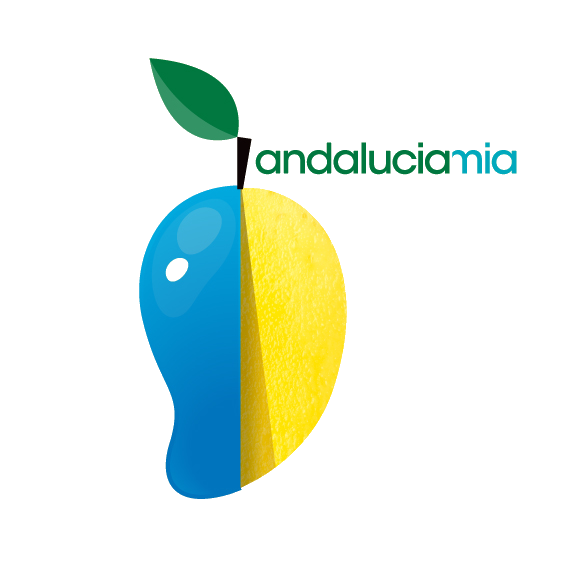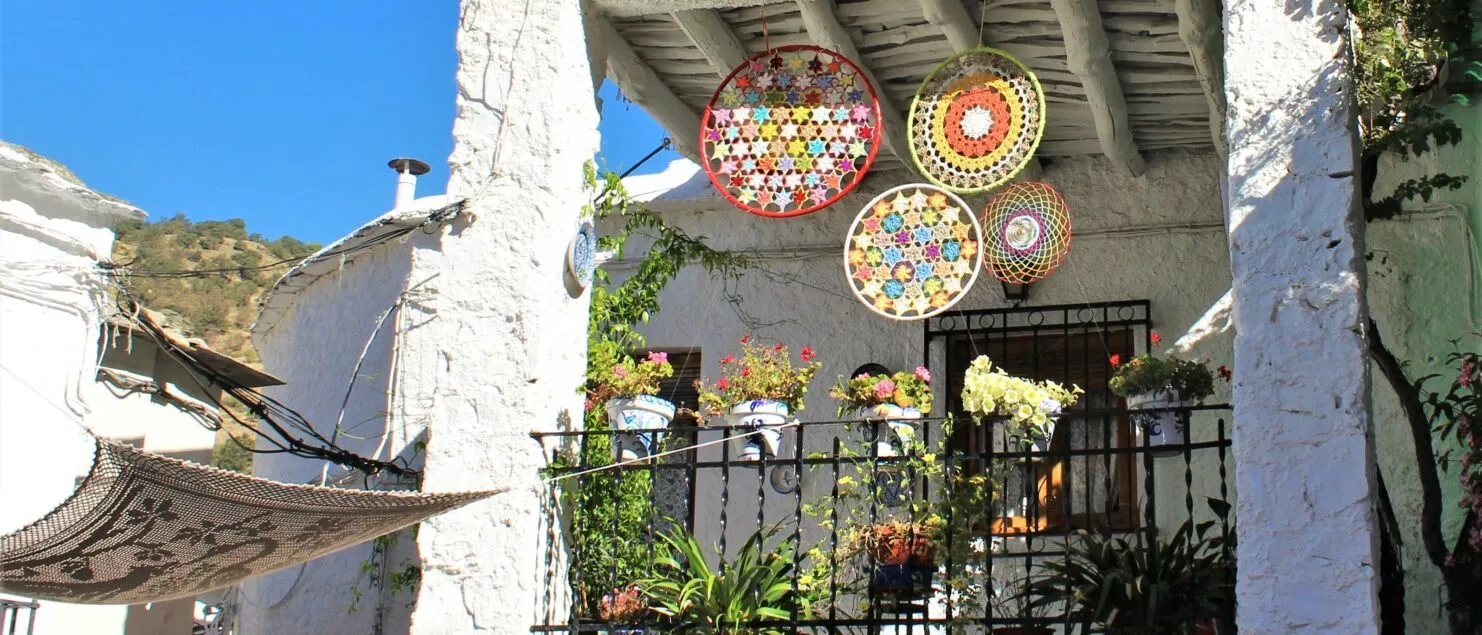Best villages to see in La Alpujarra Granada an amazing region
Discover La Alpujarra and some 0f incredible villages to see
This article will help you discover the best things to do and the best villages to see in La Alpujarra, Granada.
- A few words about the Alpujarra and its origins
- Map to locate La Alpujarra in Andalucia
- Best villages to see in the Alpujarra granadina?
- The Alpujarra and crafts: the famous jarapas!
- What to do in the Alpujarra, guided tours?
- What to see in the surroundings of the Alpujarra?
- Some useful links (rent a car, other ideas for visits)
- A selection of local experiences to discover
A few words about the Alpujarra and its origins
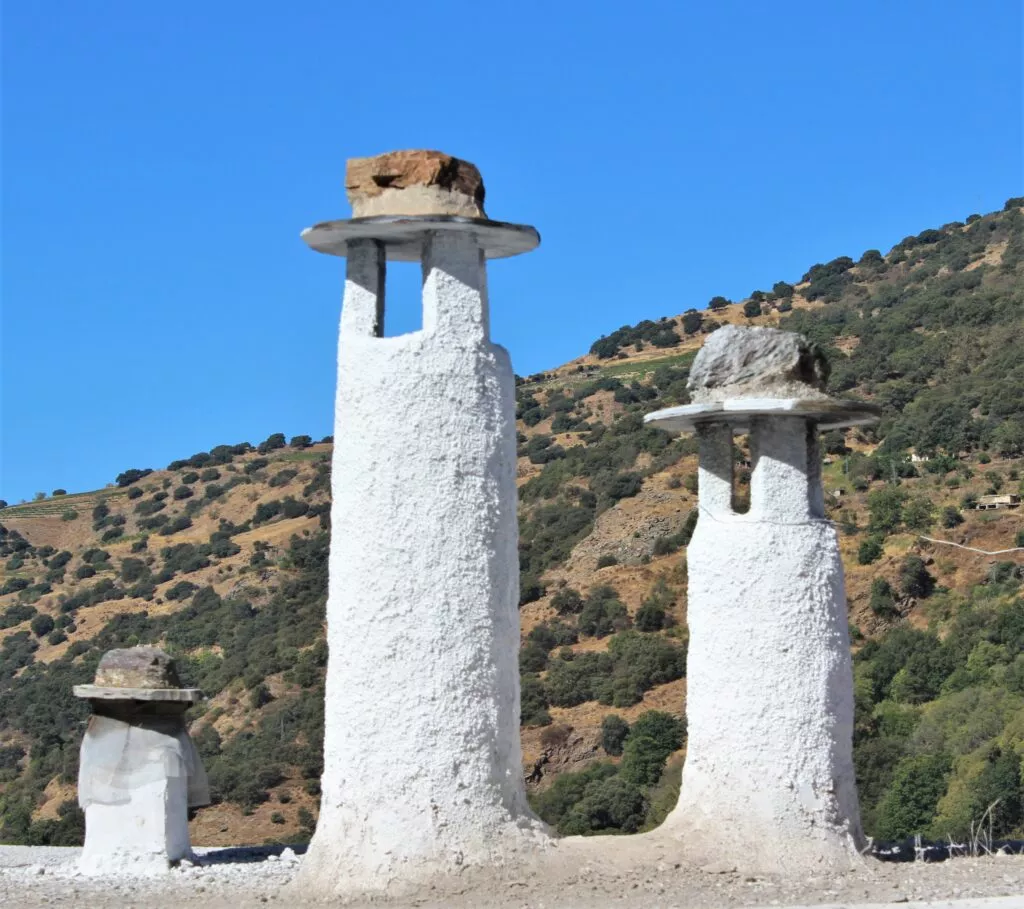
The Alpujarra is a historic region of Andalusia with a unique architecture of its villages. The Alpujarra straddles the province of Granada and the province of Almería. This is known as the Alpujarra Granadina and the Alpujarra Almeriense.
If you go on to visit the Alpujarra almeriense, I recommend visiting Laujar de Andarax and visiting Canjayar.
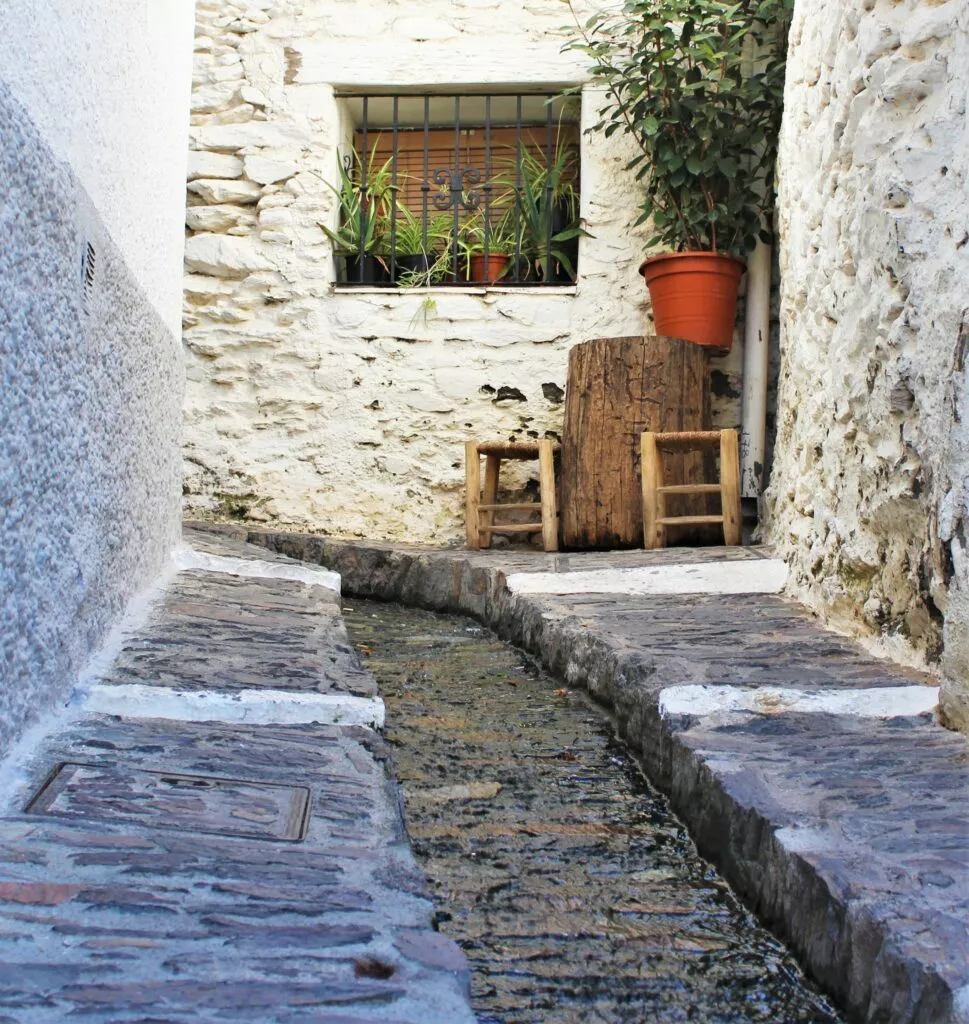
At the bottom of the article, you can also discover some great ideas for activities to do if you stay a few days in the province of Granada.
You are about to discover a small region that is a trip within your trip, if you plan to visit Granada and its province. As you will see, it is unique.
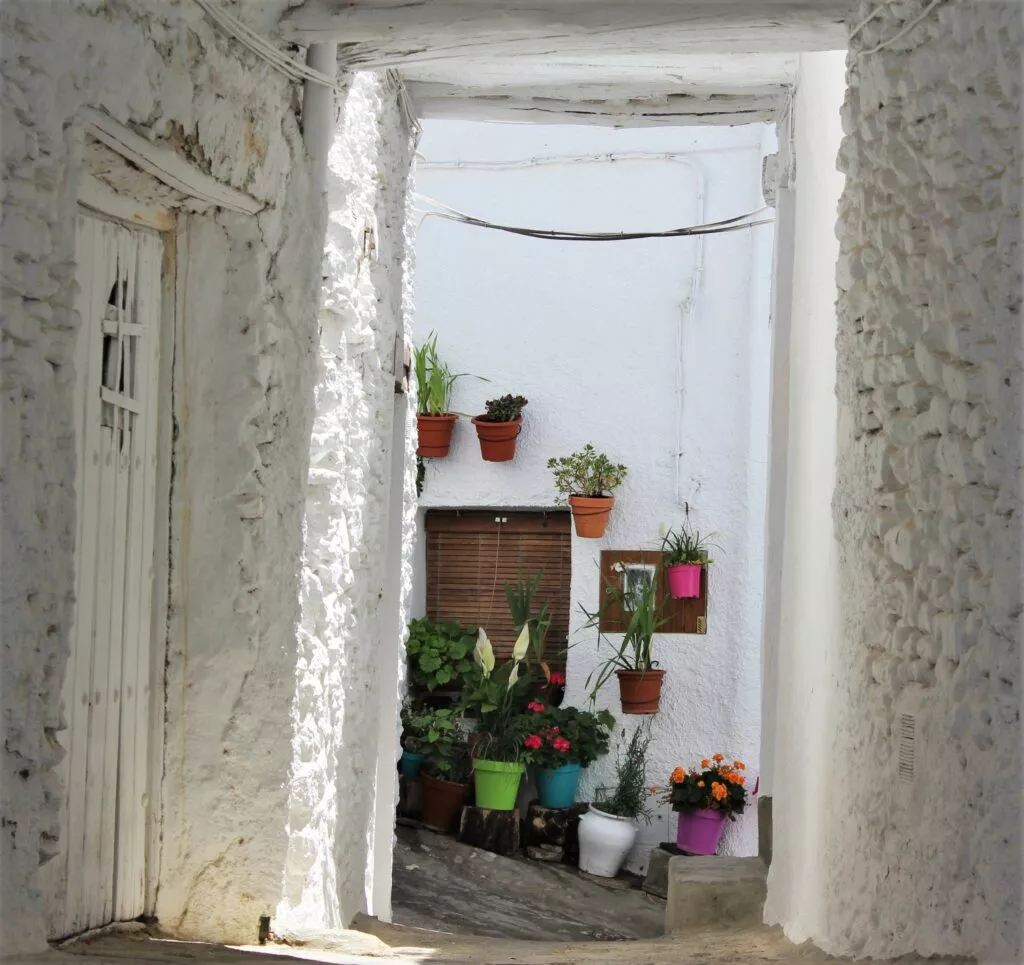
Its name comes from an Arabic word ‘al-bugscharra’ (later Spanishised to Alpujarra) which means land of pastures.
This region is geographically located on the southern side of the Sierra Nevada.
It is renowned for its exceptionally beautiful landscape of mountains, valleys and ravines. The Alpujarra also has some of the most beautiful villages in Spain, such as Pampaneira and Capileira.
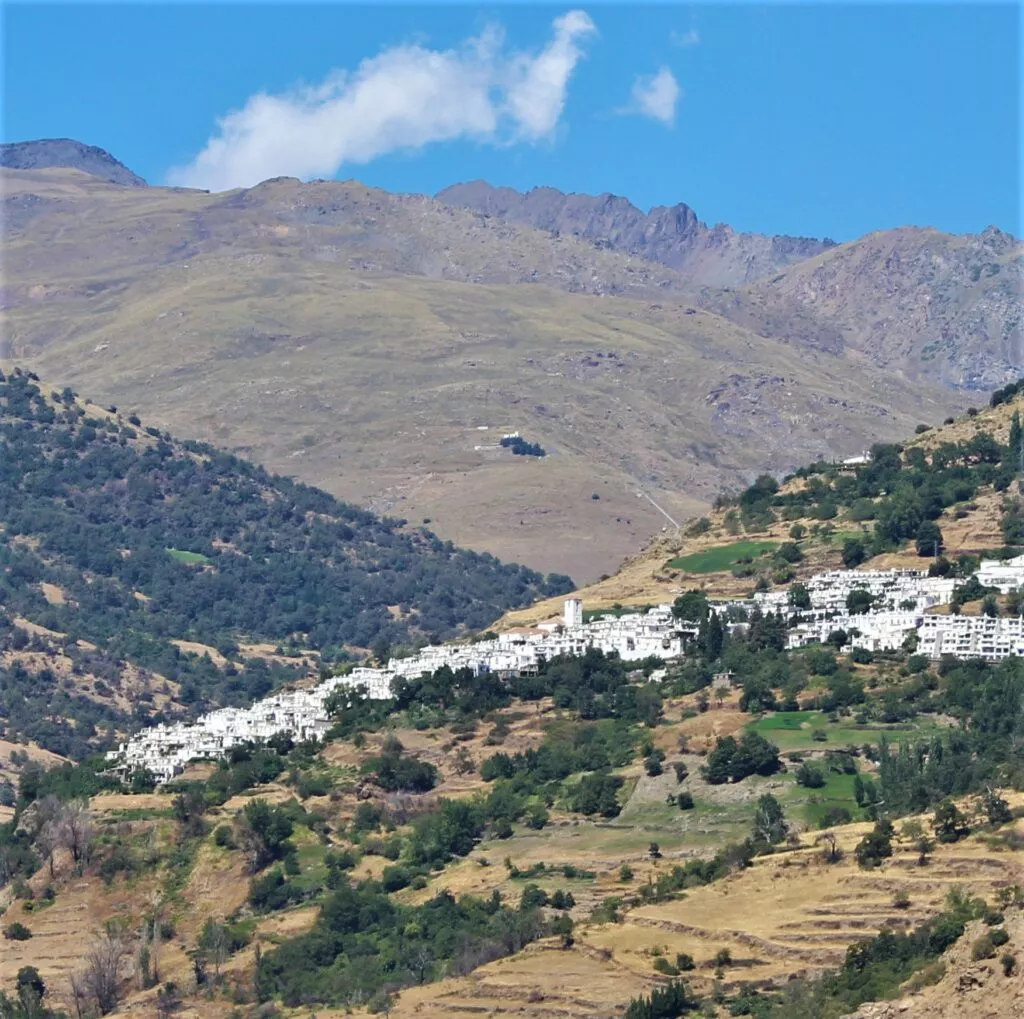
Finally, it is one of the most legally protected areas in Europe! It belongs to :
- Sierra Nevada National Park.
- The Sierra Nevada Natural Park
- Barranco de Poqueira historic site
- The historical site of La Alpujarra
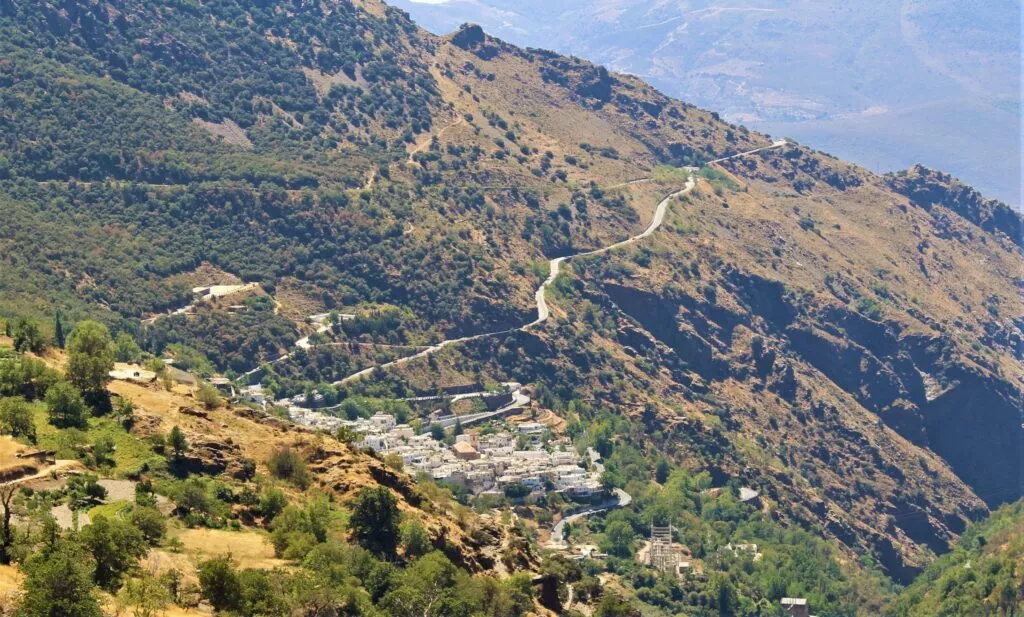
The history of the Alpujarra in a few words before seeing it
It was populated by the Iberians and Celts, then the Romans and Visigoths until the period of Al-Andalus.
After 1492 and the reconquest of Granada, a certain number of Moriscos (Spanish Muslims who converted to Catholicism) opposed to this obligation took refuge in the Alpujarra. They revolted in 1568 with the aim of “taking back” Granada. For almost 80 years they continued to live with their customs, religion and language in this isolated and difficult-to-reach region.
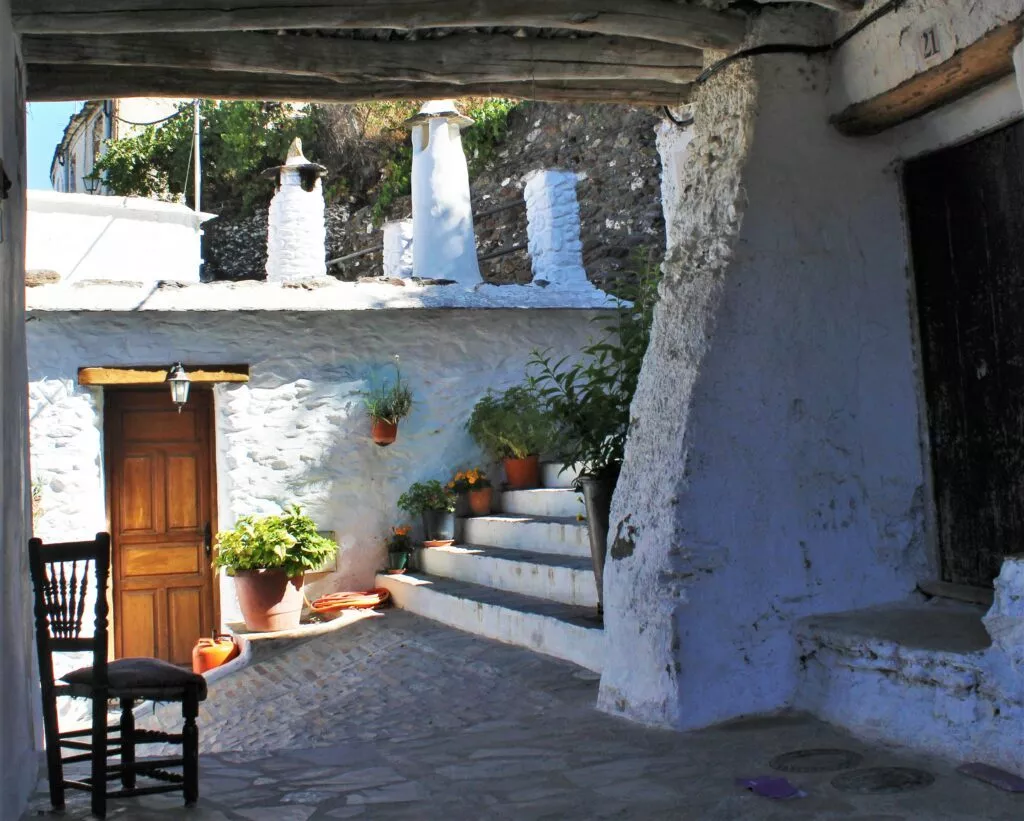
This revolt was led by Fernando de Valor y Cordoba (Christian name) whose Muslim name was Muhammad ibn Umayya. This revolt also took place on the coast, in Axarquia in the beautiful village of Frigiliana. Locally this revolt is called the Battle of the Rock of Frigiliana.
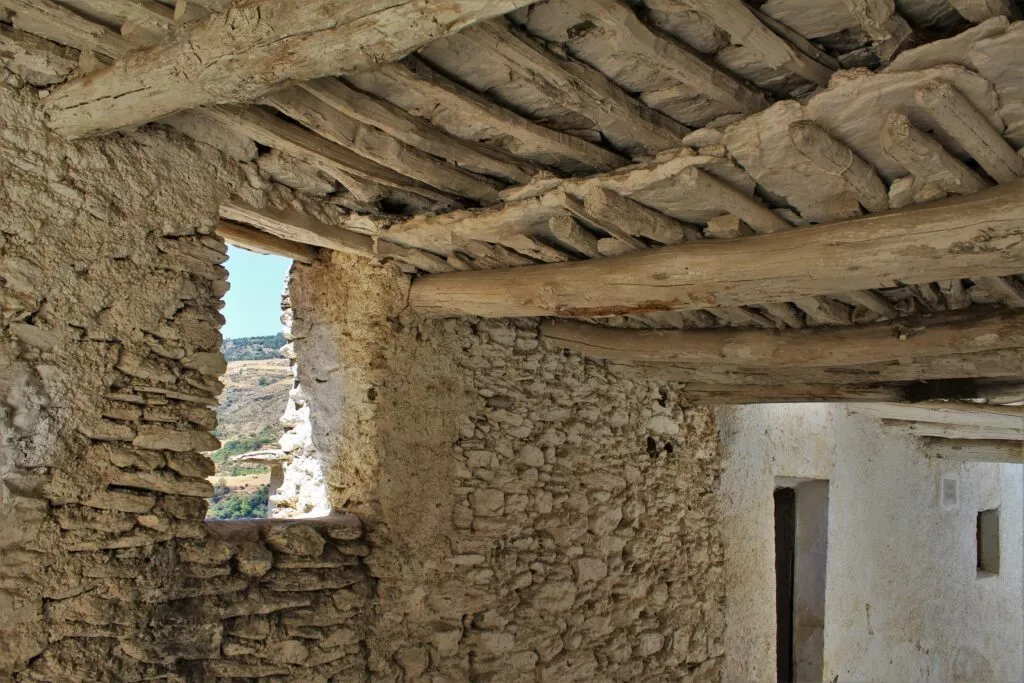
This revolt, which began in 1568, ended in a heavy defeat in 1570 and led to the expulsion and dispersion of all the Moriscos. The kingdom repopulated the villages with inhabitants from Asturias, Galicia and Leon.
What makes the identity of Las Alpujarras
The influence of the Moors is easily observable: there are many similarities with the culture of the Berbers of the Atlas Mountains in Morocco: agriculture with terrace cultivation, the architecture of the houses, the cuisine, the names of the places (especially the toponyms). There is also a common craft: the manufacture of carpets, the “jarapas”.
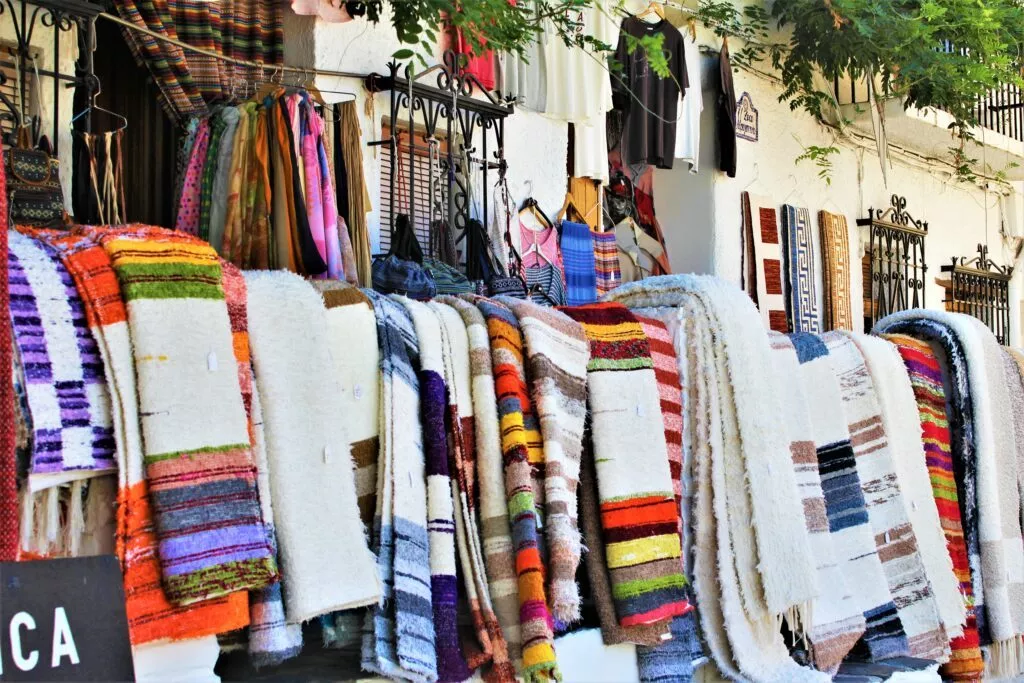
What differentiates the houses of these villages from those of the Atlas is only the white lime paint on the walls.
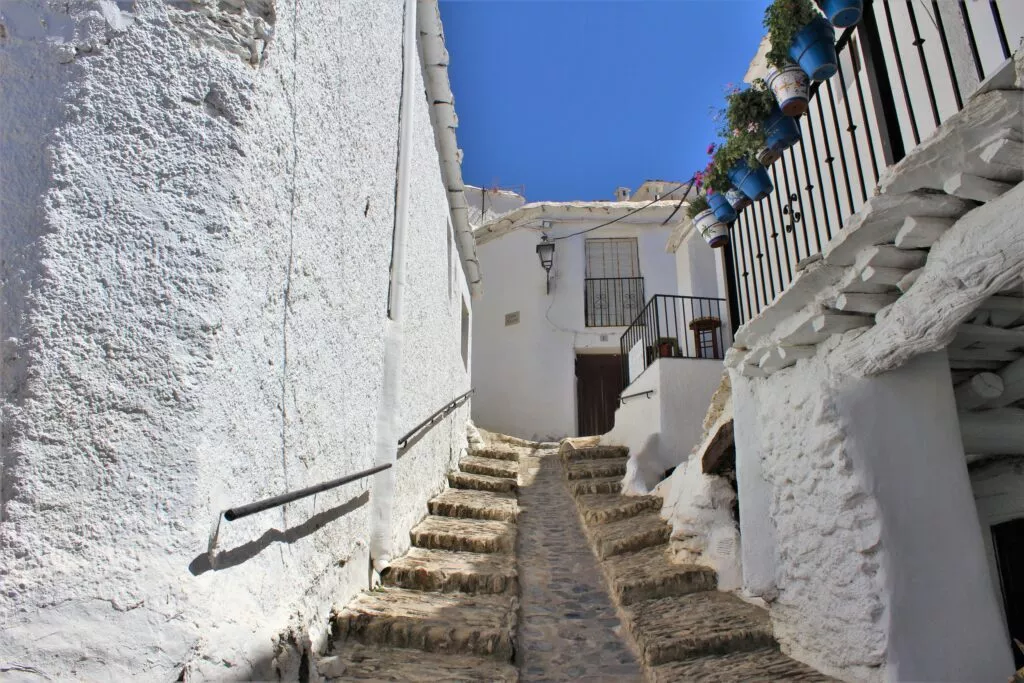
The typical dish today is the “plato Alpujarreño”.This is a mountain dish, and you have to be really hungry to finish it!
It is mainly composed of “patata a lo pobre”, blood sausage, pork loin, onion, pepper, fried egg and chorizo!
See the map to locate La Alpujarra in the province of Granada
This is the dotted red area on the map.
Best villages to see in La Alpujarra Granada
1 – Pampaneira
2 – Capileira
3 – Bubion
4 – Trévelez
5 – Lanjaron
6 – Orgiva
7 – Cañar
8 – Soportujar
9 – Handicrafts with the jarapas
Its main villages are located halfway between Granada and the coast. It is about an hour’s drive from Motril or Nerja. The first 3 villages, just a few kilometres apart, are among the most beautiful in Spain.
Visit Pampaneira in Las Alpujarras
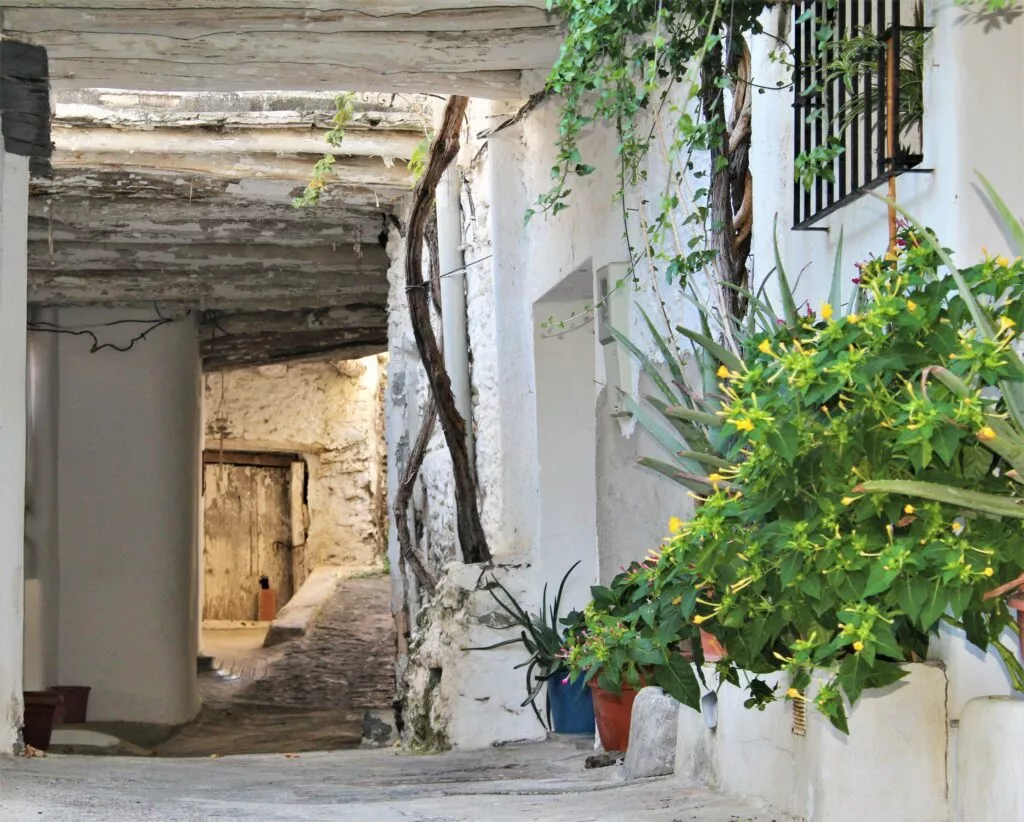
The name of the village is of Latin origin, and comes from “pampinus, pampinarius”, which means producer of vine leaves. It was known in Roman times for its vineyards.
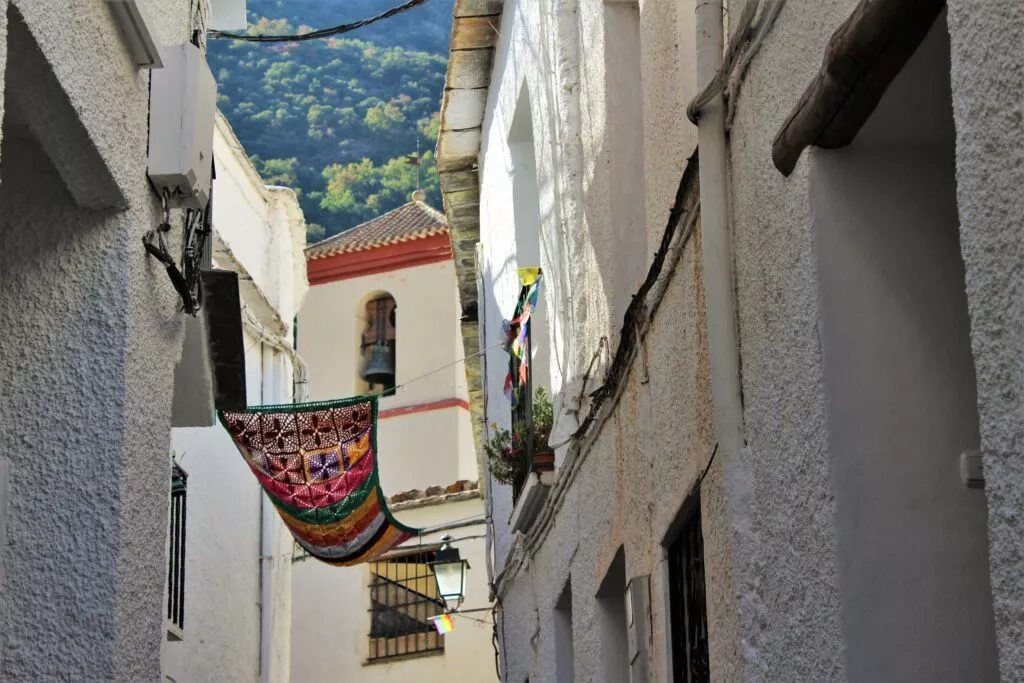
Pampaneira is located in the famous barranco (ravine) of Poqueira. This village, like those of Bubion and Capileira, has remained isolated for a long time, which has allowed a different and unique culture to develop.
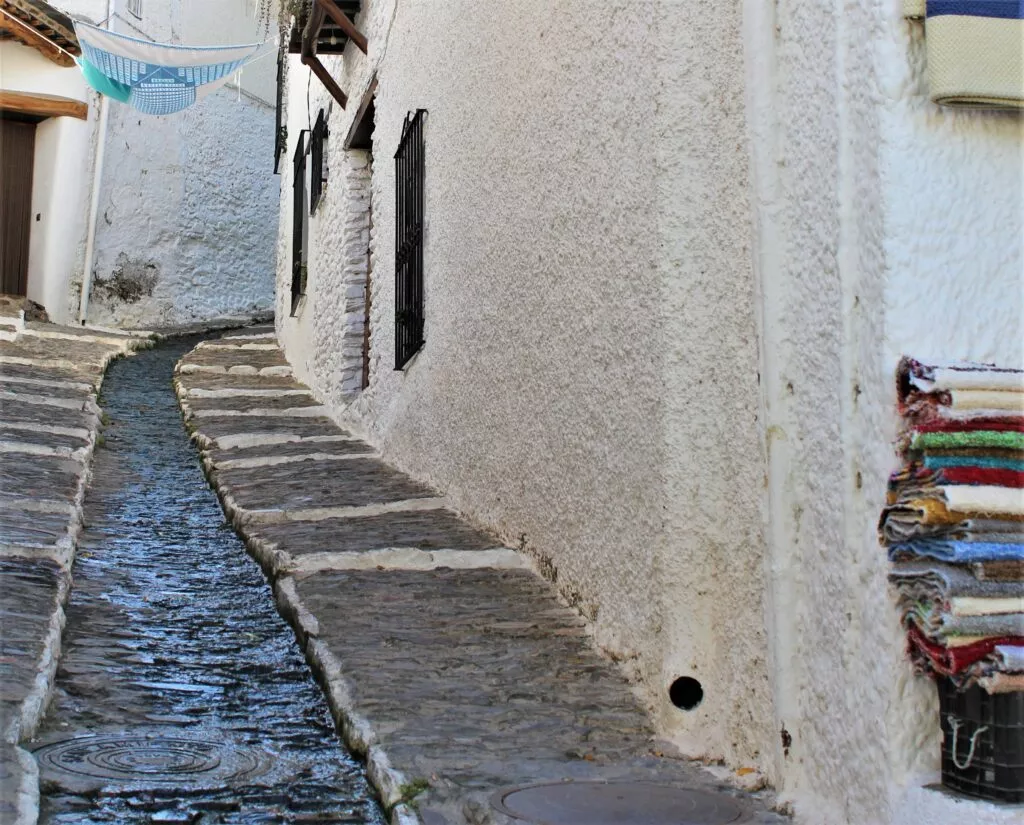
During the Arab domination, it was an important centre of silk production. The Barranco del Poqueira is one of the most visited natural areas in the province of Granada.
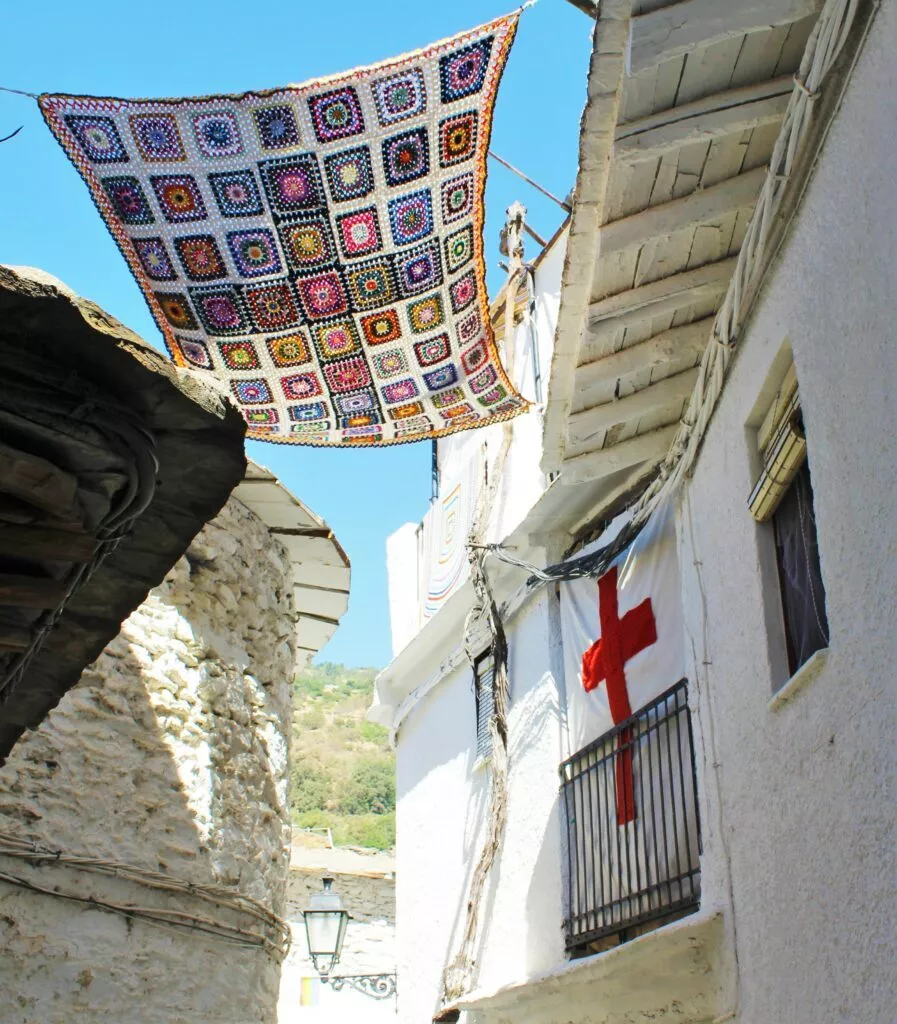
As with the neighbouring villages, it has two parts. The upper part of the village was inhabited by shepherds and the lower part by farmers.
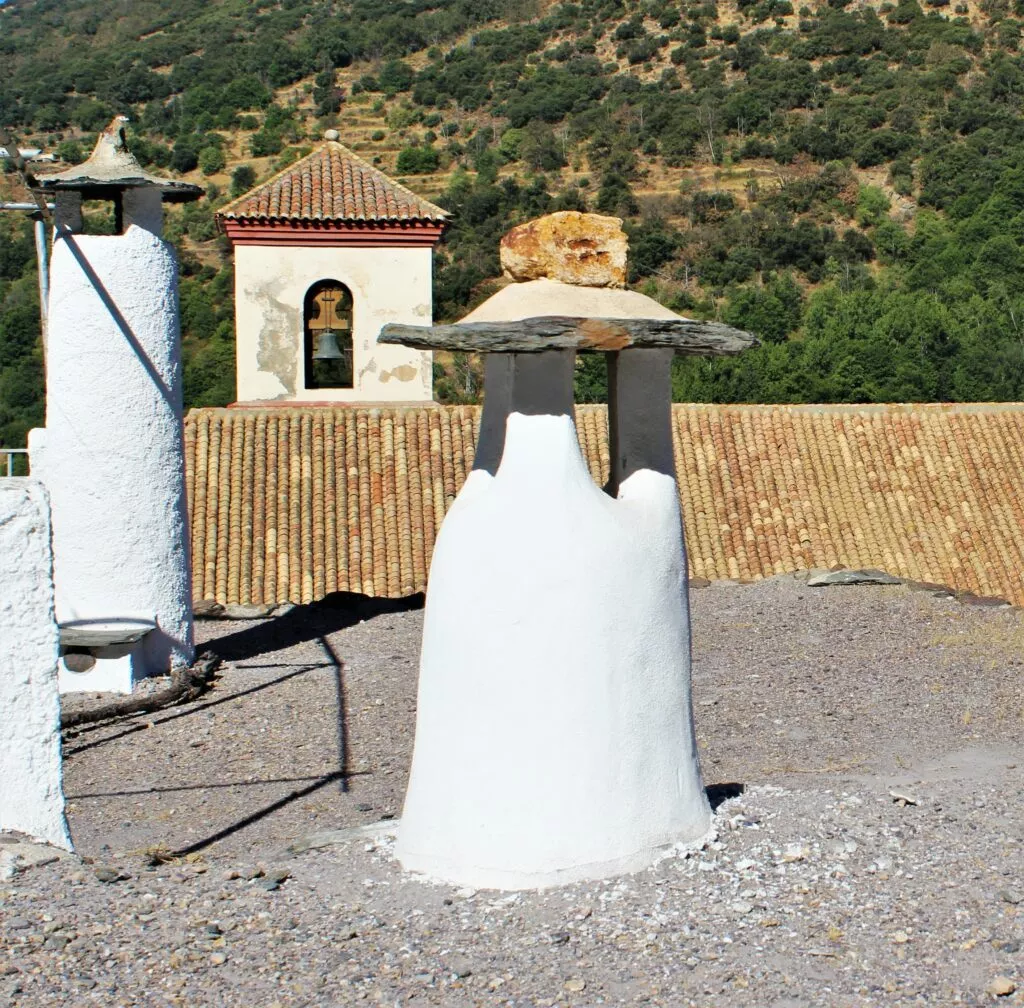
Important remains from the Al-Andalus period have been found, such as those of Alayar and Belezmín. The latter was the first settlement of the Taha de Poqueira. It is one of the few Taha (administrative district of the kingdom of Granada) that was founded by Yemenis.
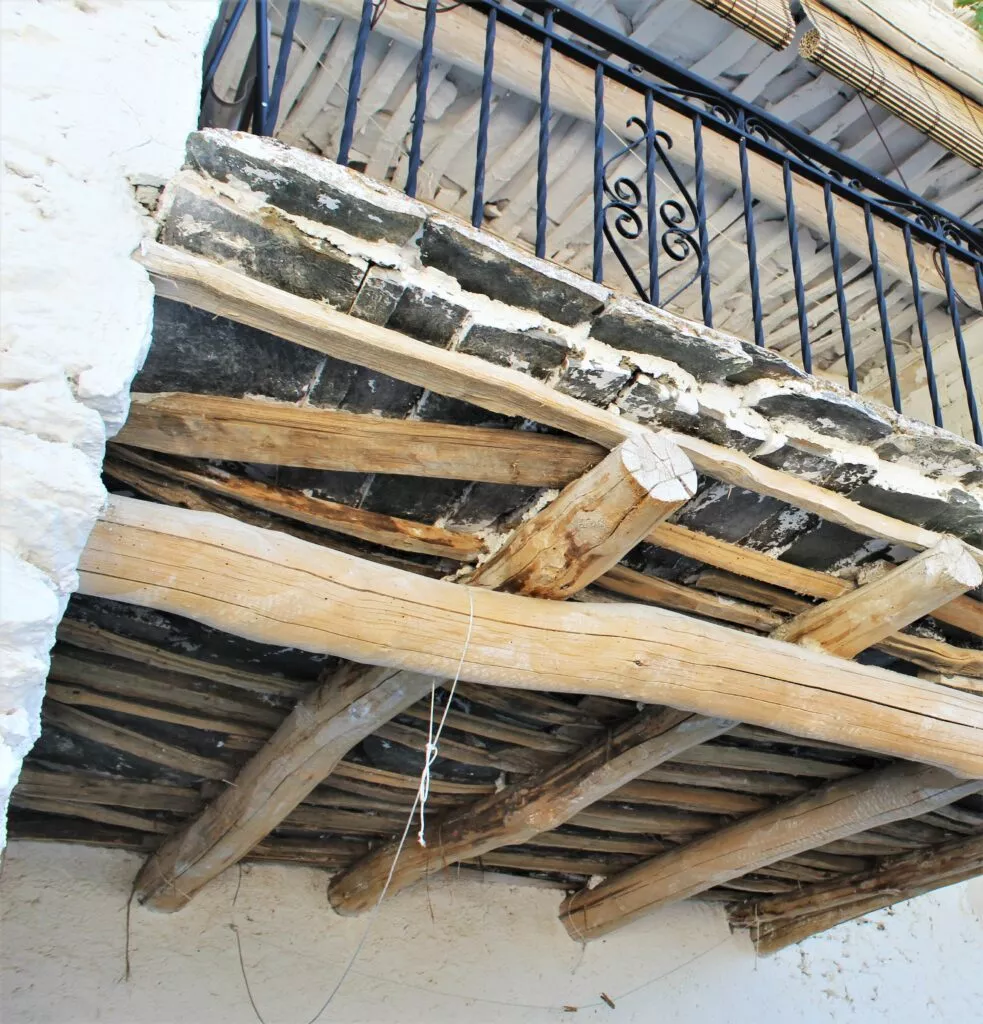
Pampaneira enjoyed great wealth and influence during the Nasrid period, thanks to the silk trade that made its reputation.
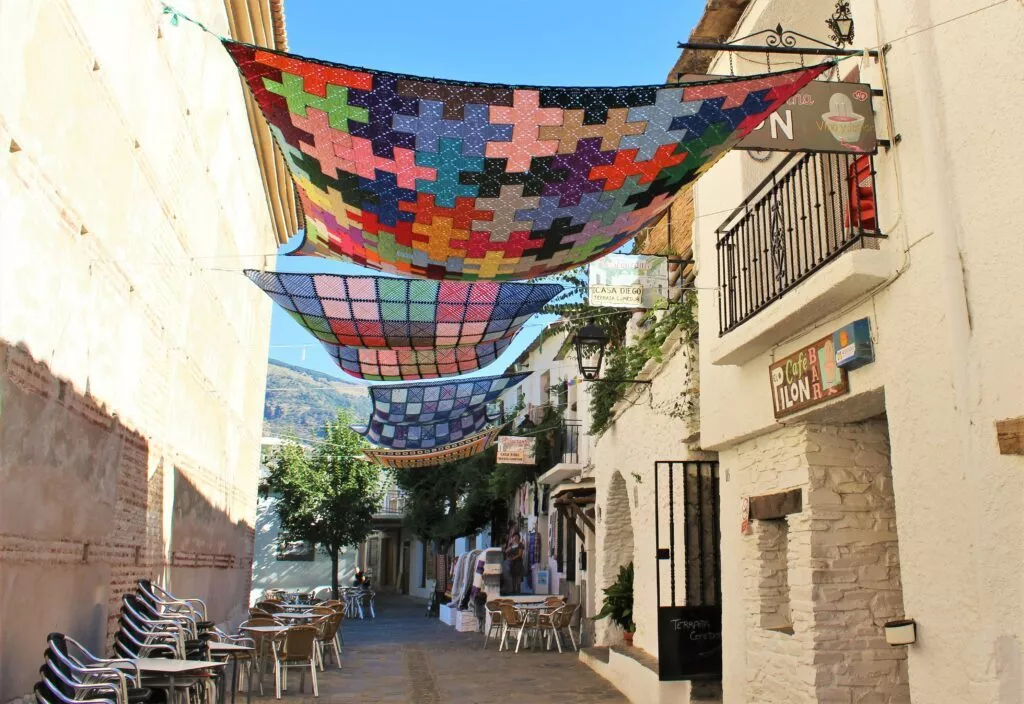
A wonderful festival in Pampaneira
Here’s a great music festival, held in the streets and terraces (Tinaos) every year at the end of June and beginning of July:

Book accommodation in Pampaneira
Visit Capileira in La Alpujarra Granada
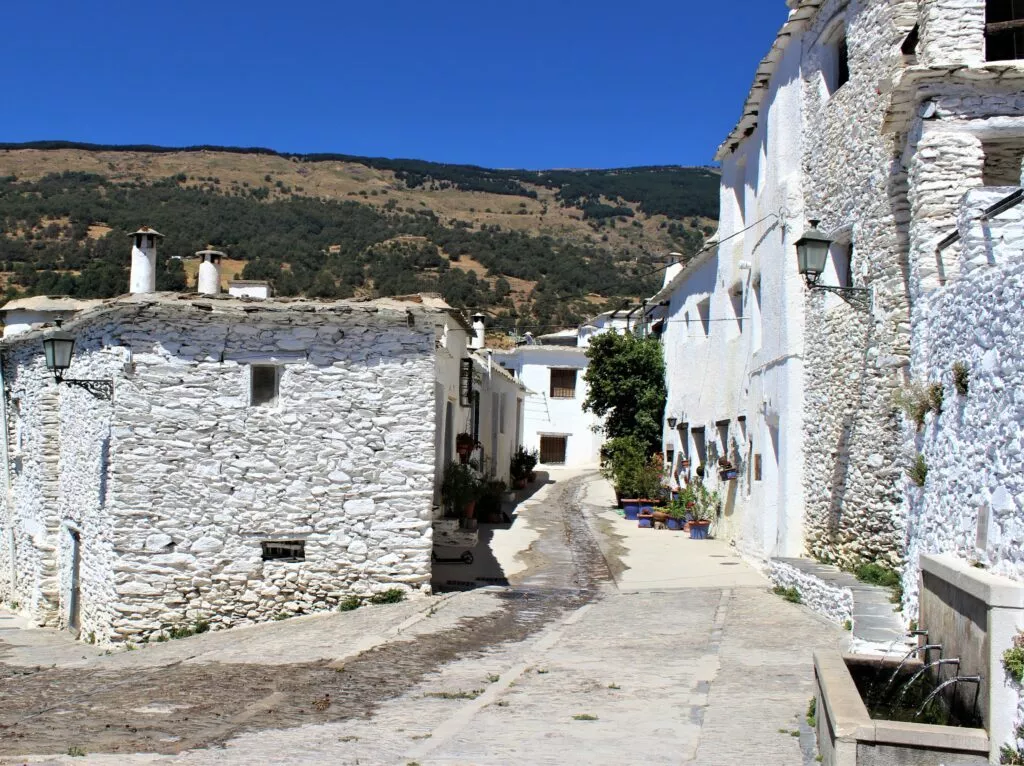
The name of the village is of Latin origin ‘capitellum’ which means ‘summit’.
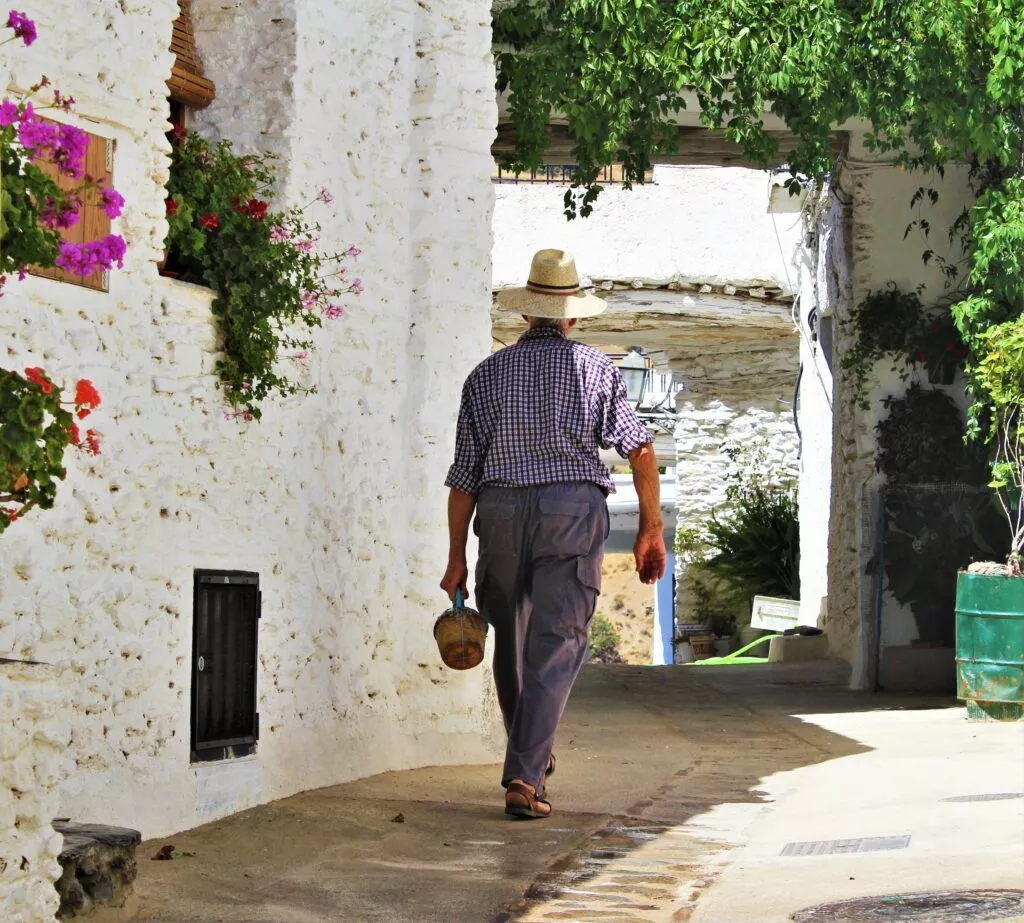
Capileira is the highest village in the Poqueira barranco.

It is the second highest village in the Iberian Peninsula after the neighbouring village of Trevelez. It is located at an altitude of 1436 metres.
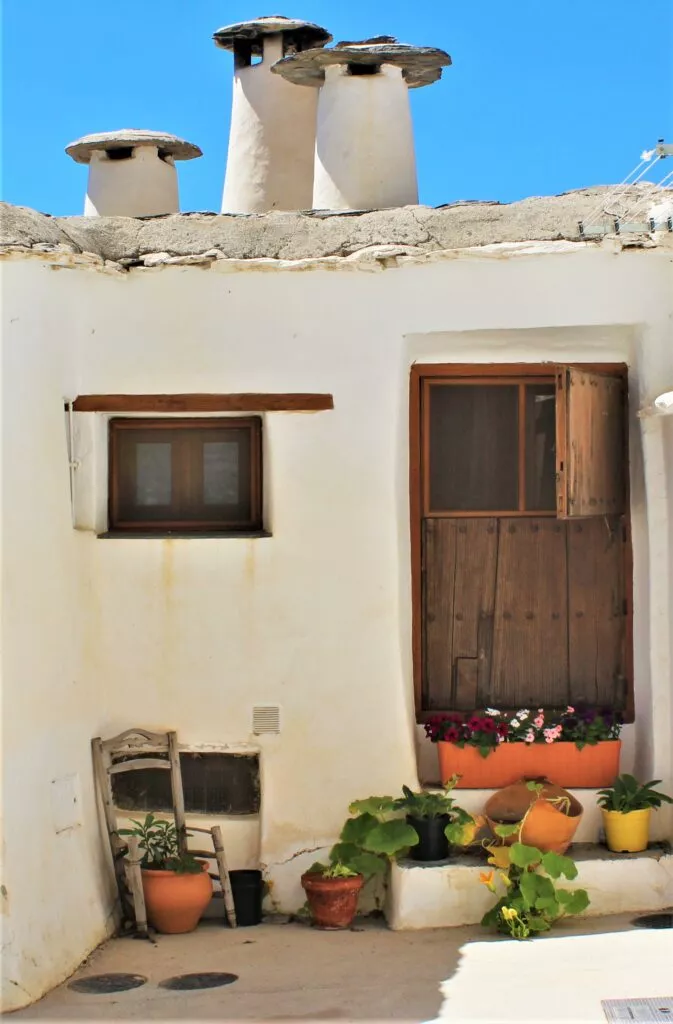
Capileira has 12 fountains, as in the neighbouring villages. They had different functions such as: washing clothes, drinking, irrigating, or serving as a watering place for animals.
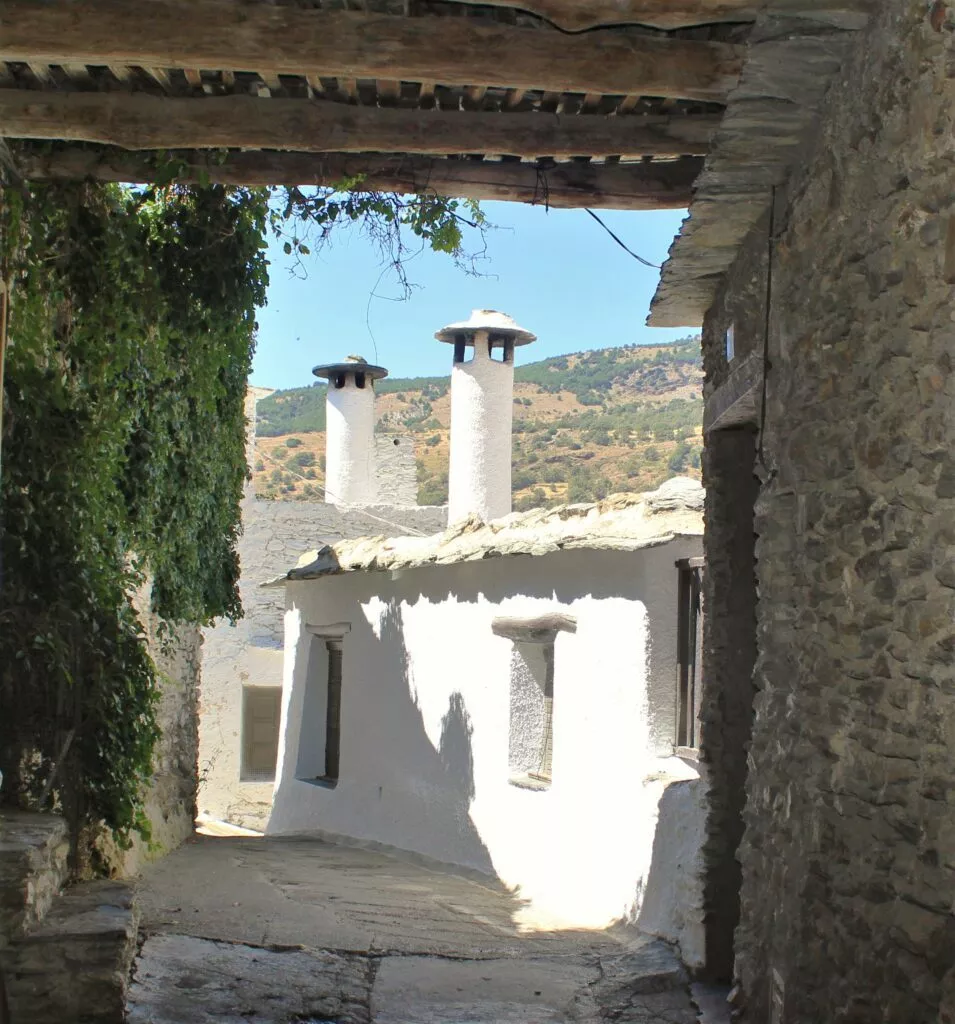
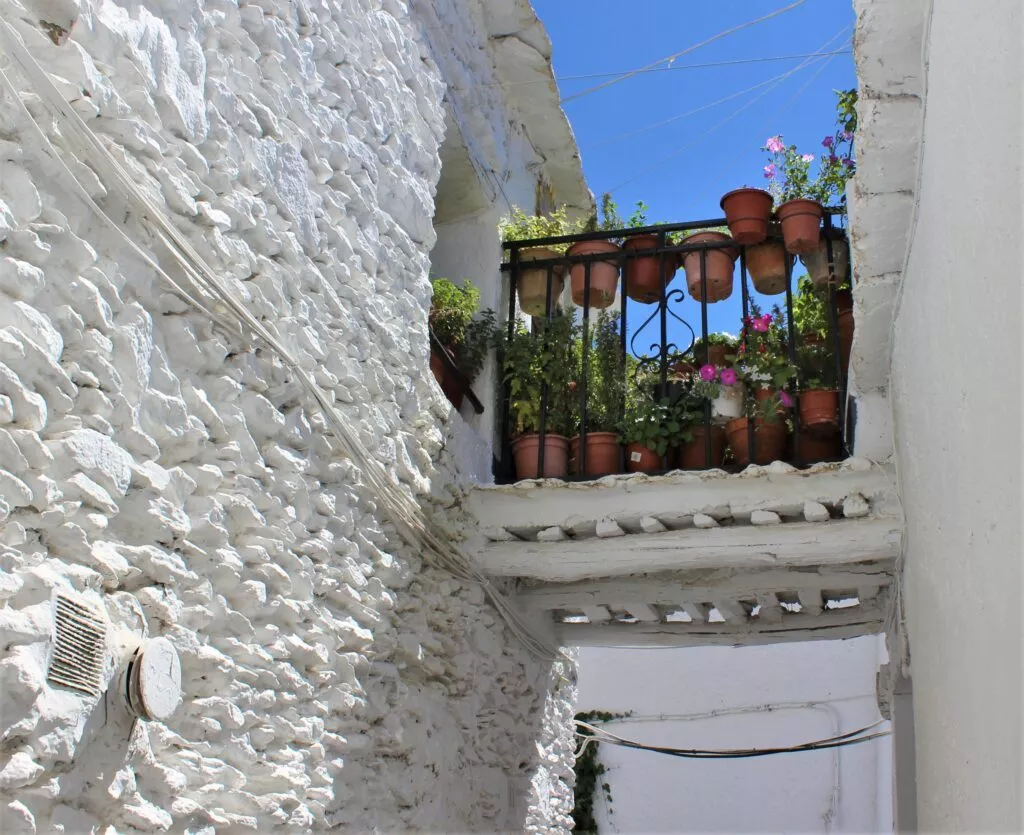
Book accommodation in Capileira
Bubion
Bubion is located 2-3 km from both Capileira and Pampaneira. It is also very beautiful. You can visit the “casa alpujarrena” museum.
Trévelez
The village is called “En Trevelez tocaras el cielo”. This means: In Trevelez you will touch the sky!
It is the highest village in Spain, at 1746 metres above sea level. Houses are particularly characteristic of this region, like the other villages: flat roofs with a chimney, balconies (tinaos), narrow and steep streets.
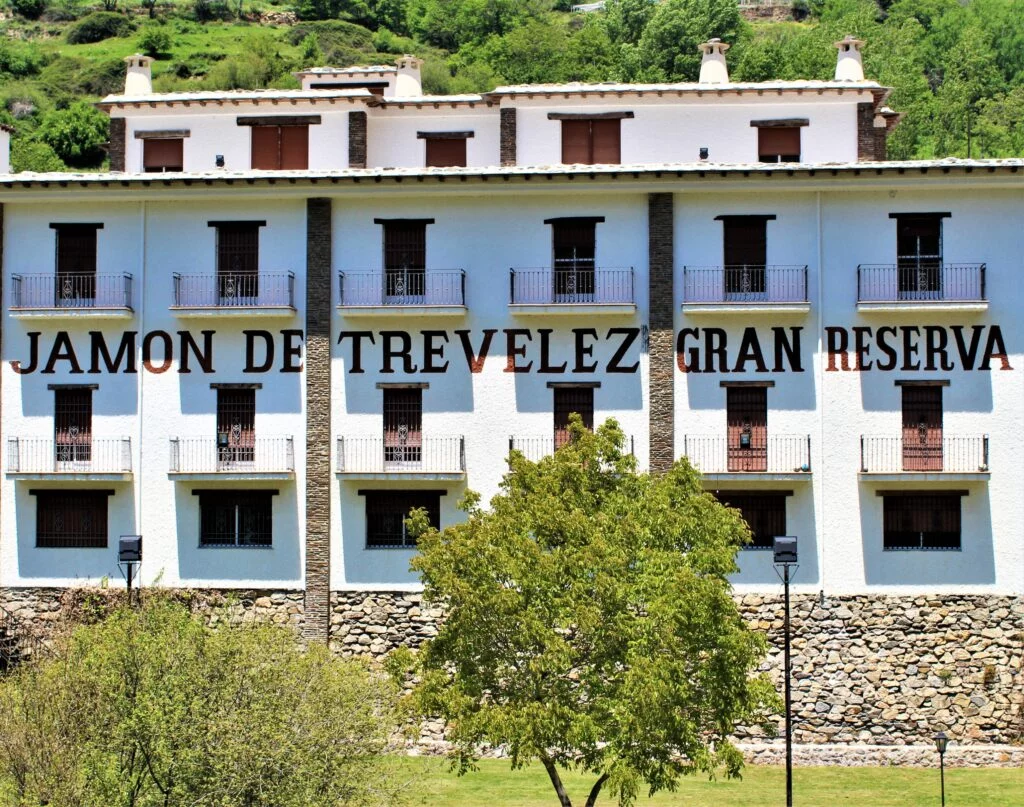
The highest peak in the Iberian Peninsula is in the municipality of Trevelez: Pico Mulhacén, with an altitude of 3479 m. The name of this peak comes from the name of the Nasrid king Mulay Hasan. This story goes that he was buried on top of this peak. He was the second last Nasrid king, his son Boabdil abdicated in Granada in 1492.
This village is very famous for its hams.
Lanjaron
This village is known as “The Gateway to the Alpujarra”. Its reputation is due to the quality of its mineral and medicinal waters.
In the village you can visit a curious museum….the water museum! It is built on an old water mill and its architecture is a total success.
If you are interested in discovering and booking a stay, a weekend in the famous spa of the city: Balneario de Lanjaron.
Orgiva
The Moorish influence is very marked in the village also by its architecture. It is the largest town in the Alpujarra. Its church is of absolute beauty.
Cañar
A small village, part of the “balcony of the Alpujarra” that has remained typical. Its church and the village square next to it are of absolute beauty.
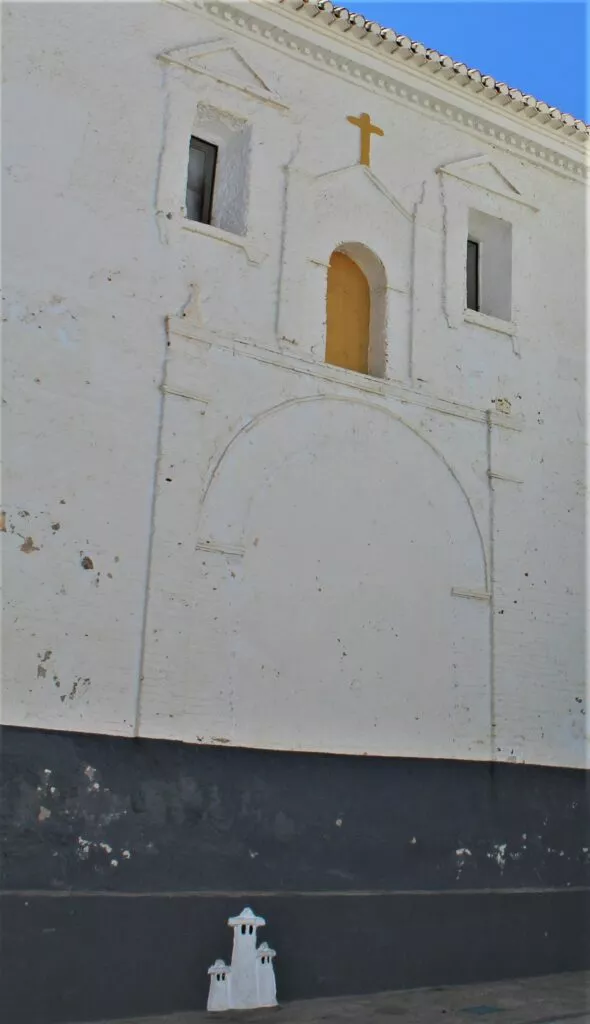
Visit Soportujar the witches’ village in the Alpujarra
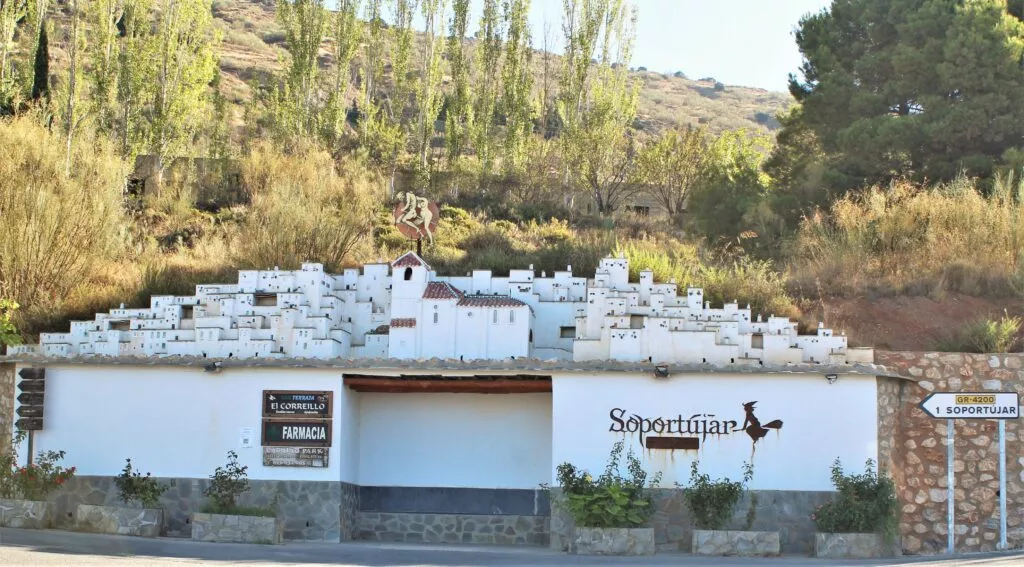
The witches’ village. This village became the witches’ village when it was repopulated after the reconquest by villagers from the north of Spain. They came with their beliefs and legends.
The Alpujarra is known for its handicraft with jarapas, a must-see
Jarapas are multicoloured carpets made by hand in these villages on looms.
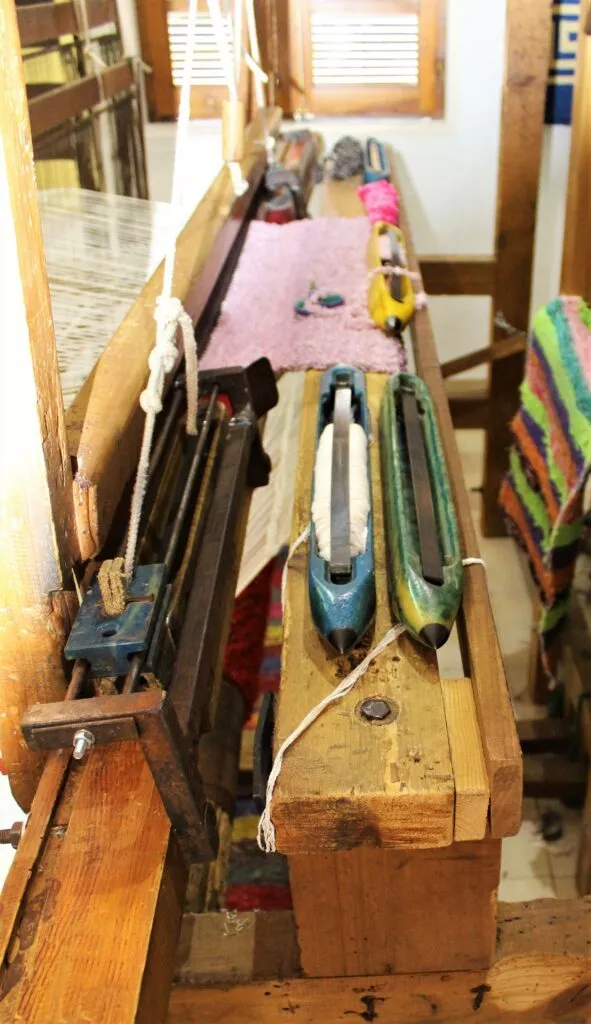
This craft developed after the expulsion of the Moors who left behind the looms used to make silk. The mulberry fields, at that time, surrounded the villages to feed the silkworms.
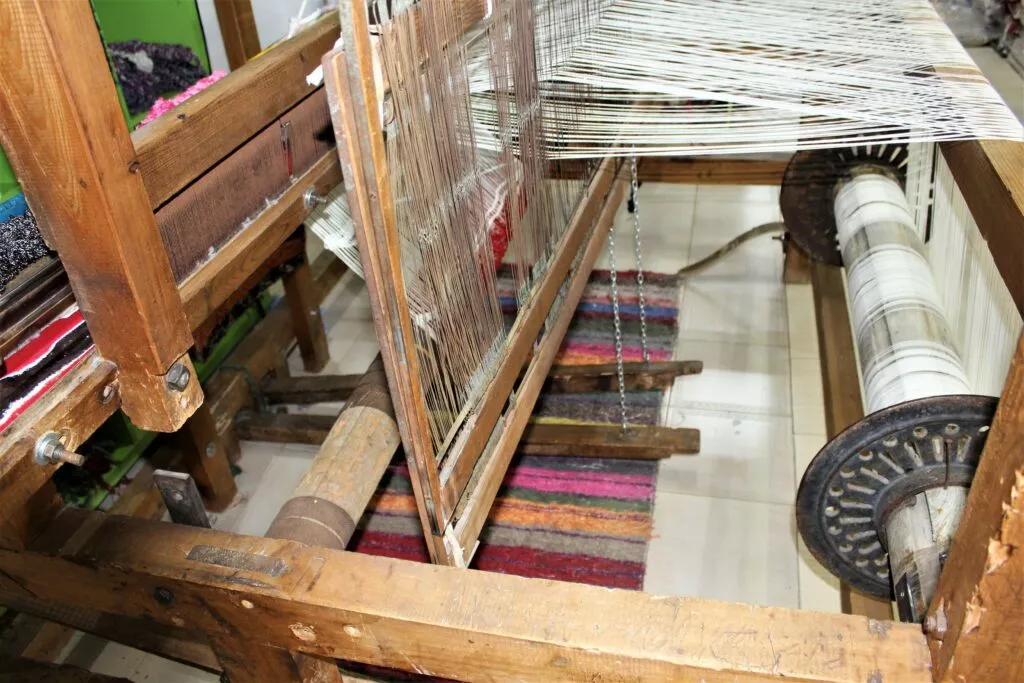
Jarapa is a coarse fabric, so it is used to make rugs but also blankets, bedspreads and curtains.
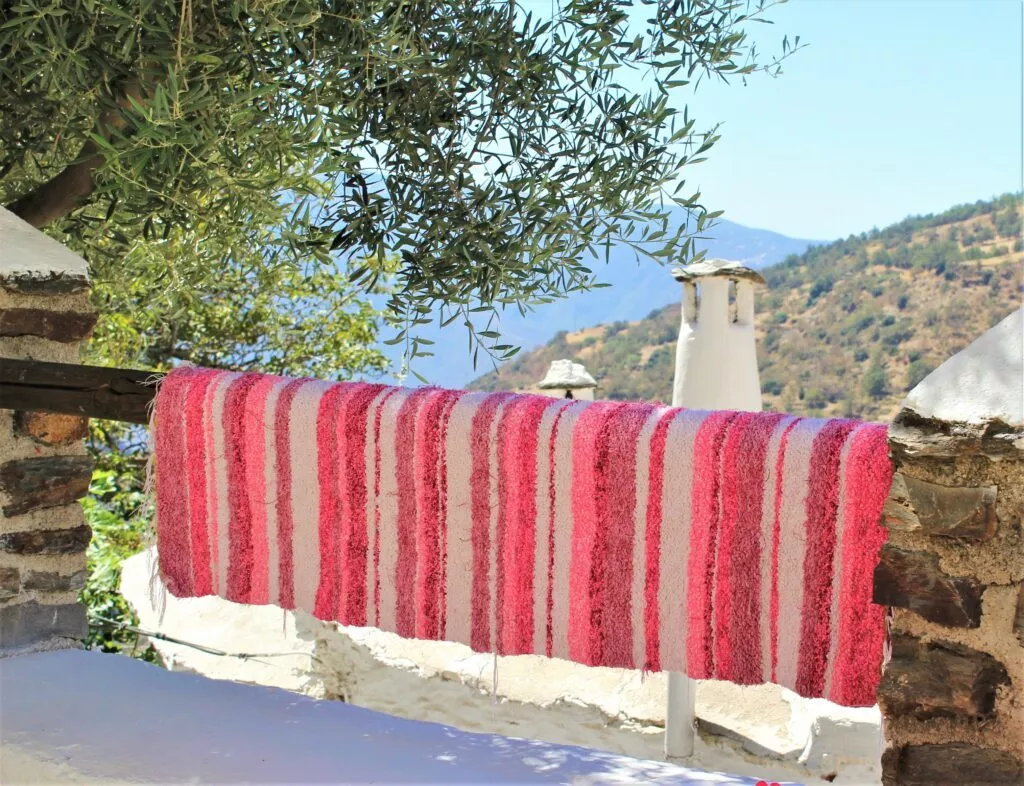
Originally: from rags, old clothes and rags the threads were taken to make these famous jarapas.
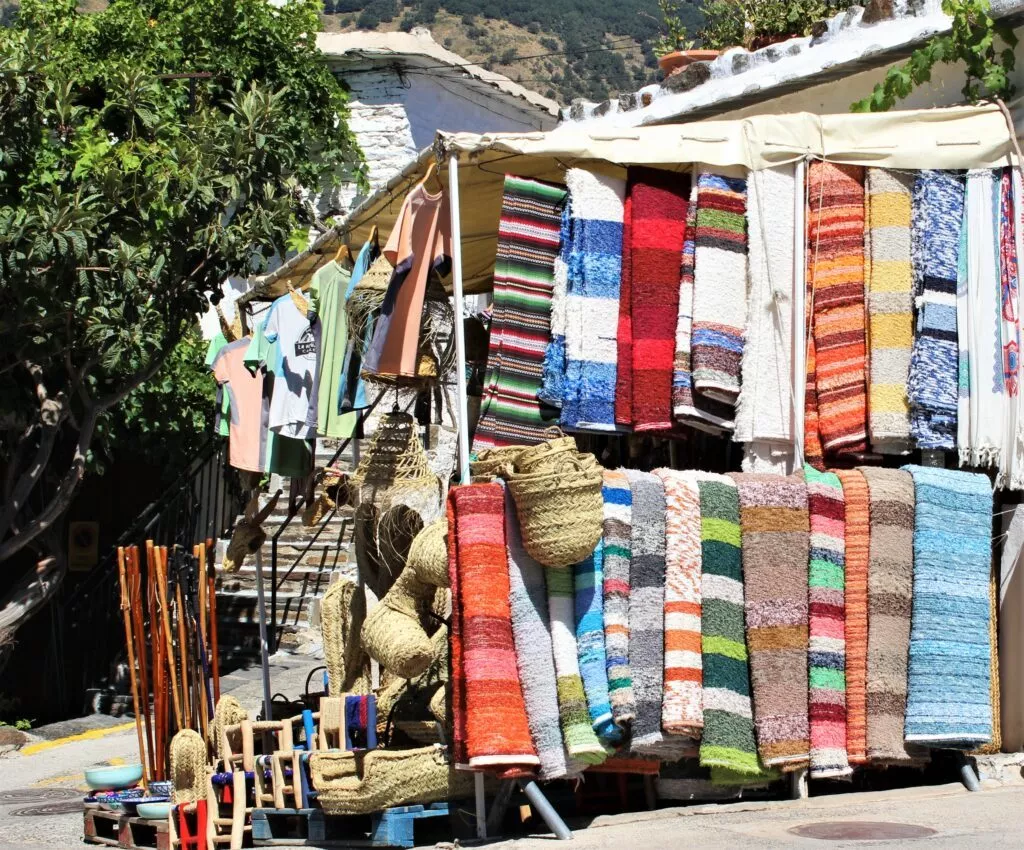
Today, the process has remained the same, except that the threads from old clothes and rags are no longer used. Instead, the threads from overstocks of towels and other such items are used to make jarapas!
What to do in the Alpujarra, guided tours?
Below are a number of ideas for activities and visits, categorised by theme. You can book them online today.
Bonus: all activities can be cancelled up to 24 hours before the scheduled date:
In the folllowing link one of the best experience in whole Andalucia for nature lovers : a 4 Day Breathtaking Sierra Nevada Mountain Ride from Lanjaron – Alpujarra -.
In the event that you are on holiday on the “Costa del Sol Oriental”, the eastern part of Malaga:
From your place of stay between Nerja and Torre del Mar, a guide organises a day trip to discover the Alpujarra granadina and its most beautiful villages. This tour is only available as a private trip (2 to 8 people max).
To find out more about the tour and request a quote, click on : private Tour to La Alpujarra granadina.
What to see around the Alpujarra?
If you want to go to the coast, the small white village by the sea, called Salobrena, is a little wonder to discover. Salobrena is known as the “Pearl of the Costa Tropical”.
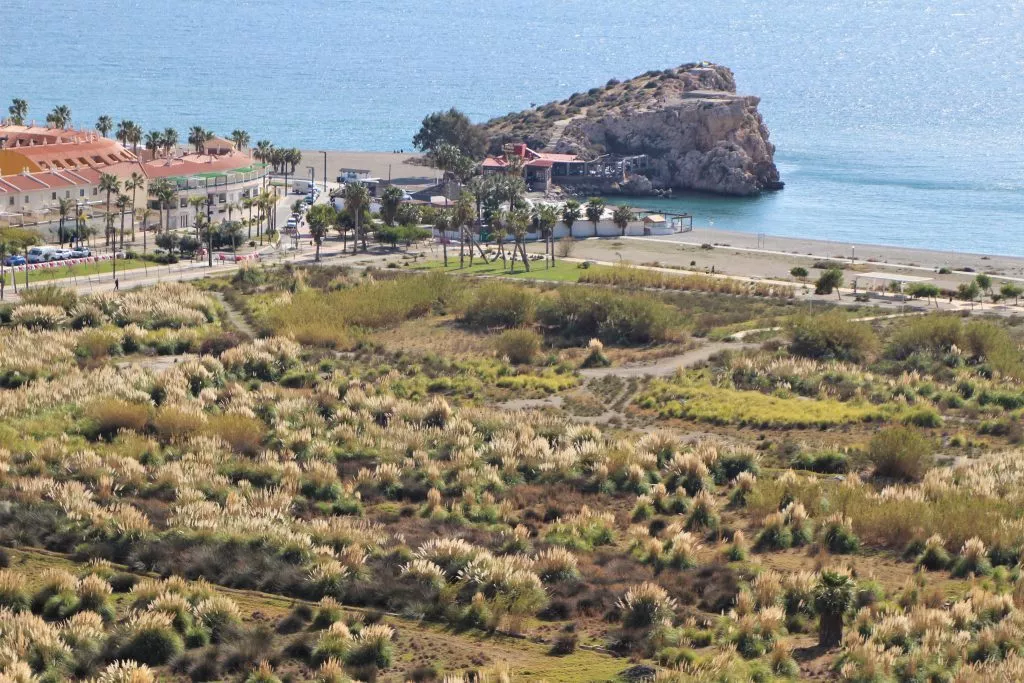
Continuing your journey in the Province of Granada, I invite you to come and discover the small town of Guadix….One of the largest cave dwellings in the world. Nearly 3000 people live in the caves of the town today!
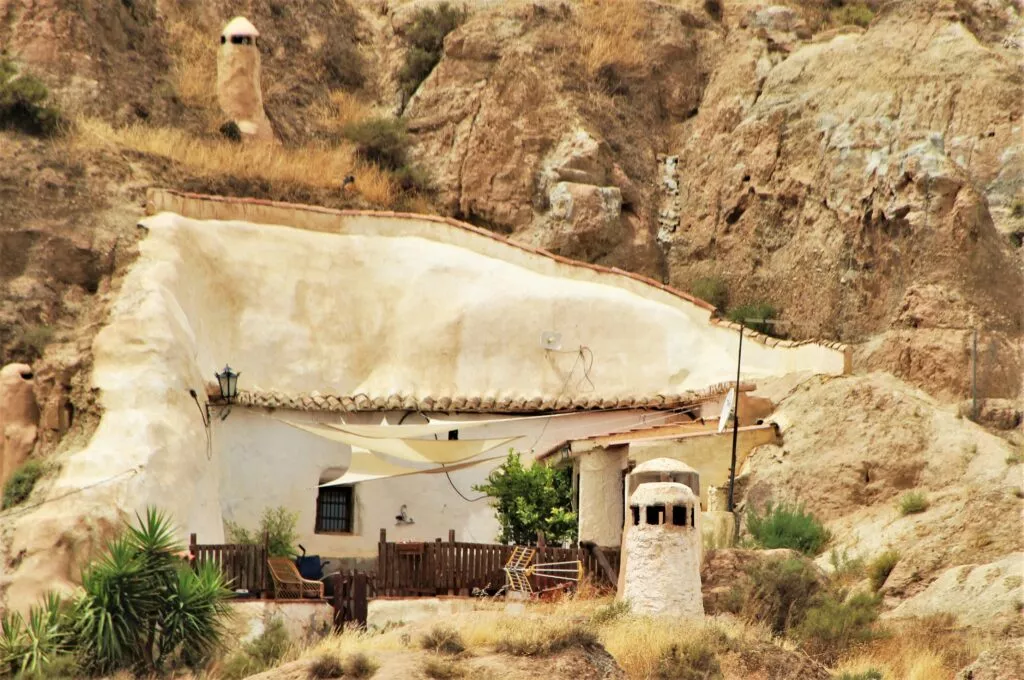
Some useful links (car hire, ideas for visits)
Easy and economical bookings
If you are in Andalusia as part of a tour with several major cities to visit, here are some links that may be of interest:
Seville
Seville, the capital of Andalucia, is a city full of treasures to discover and monuments to visit.
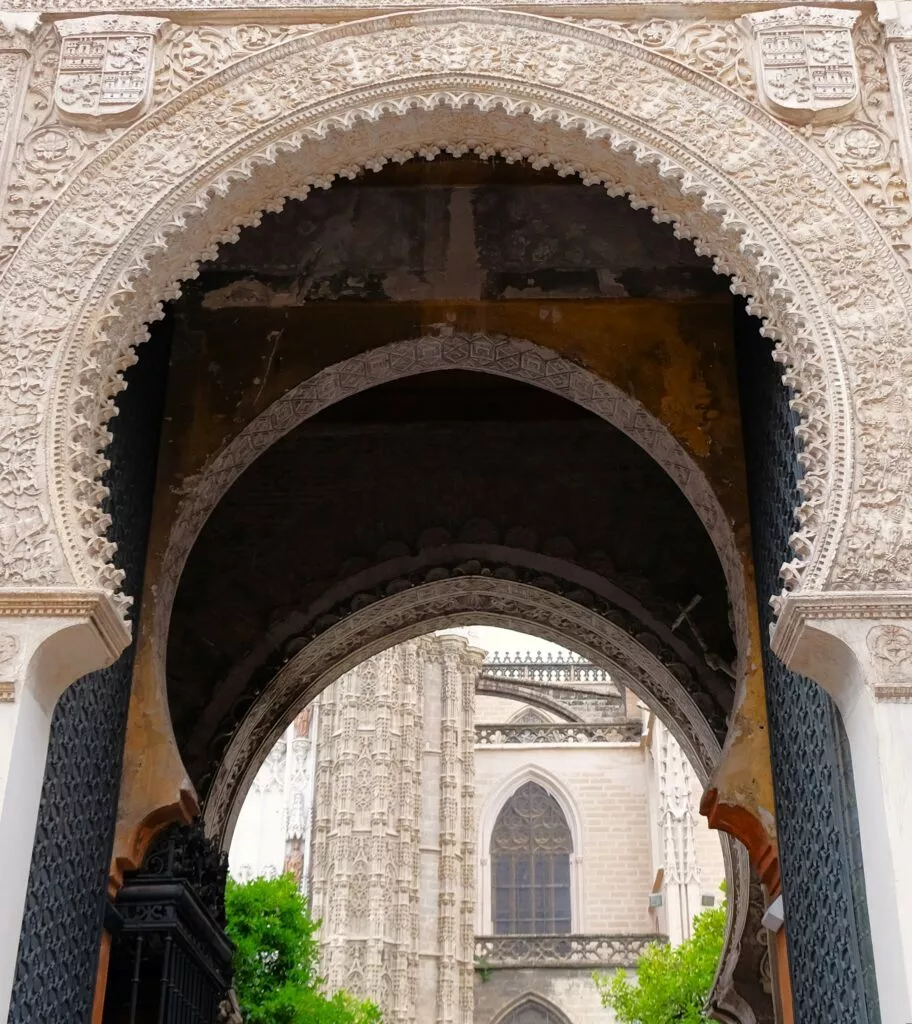
Here you will find everything you can see in Seville in 3 days. And for those who will stay longer you will also find information on secret Seville and the Santa Cruz and Triana districts.
Cadiz
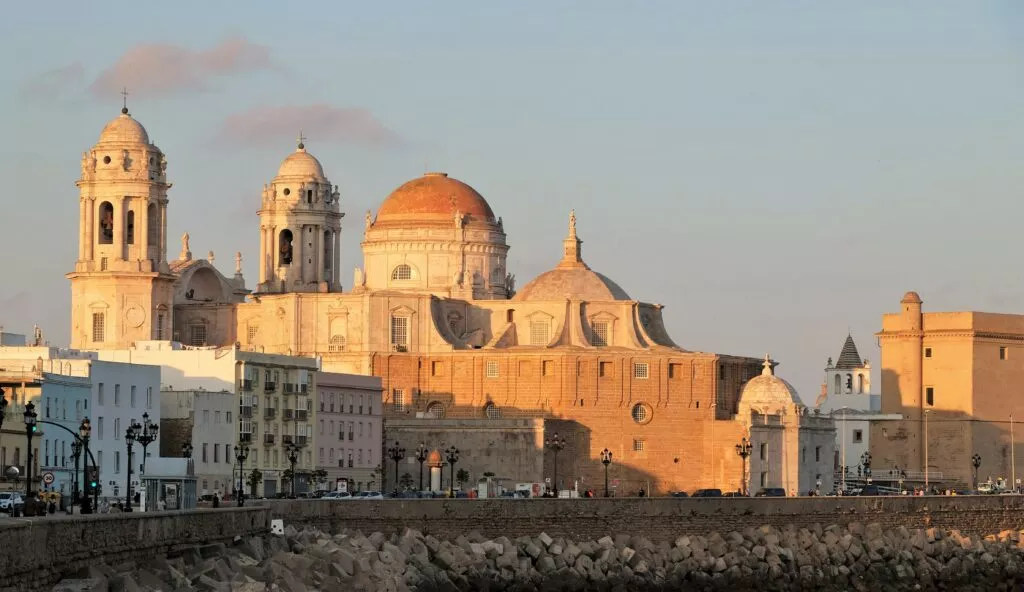
Visit Cadiz, a city with an incredible past and great beauty, on the Costa del la Luz.
Malaga
When you reach the Costa del Sol you will find in this link all must-sees in Malaga :

Granada
Discover what to see in Granada, and visit the Albaicin and Sacromonte districts:
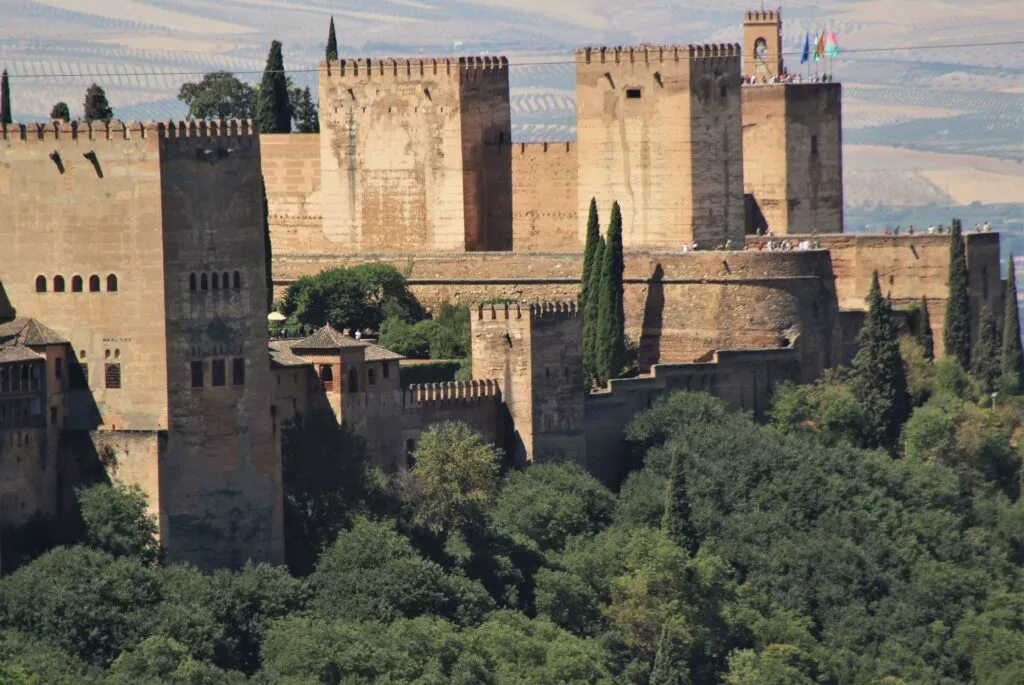
Cordoba
And of course, visit Cordoba, the caliphate city, and the Juderia district
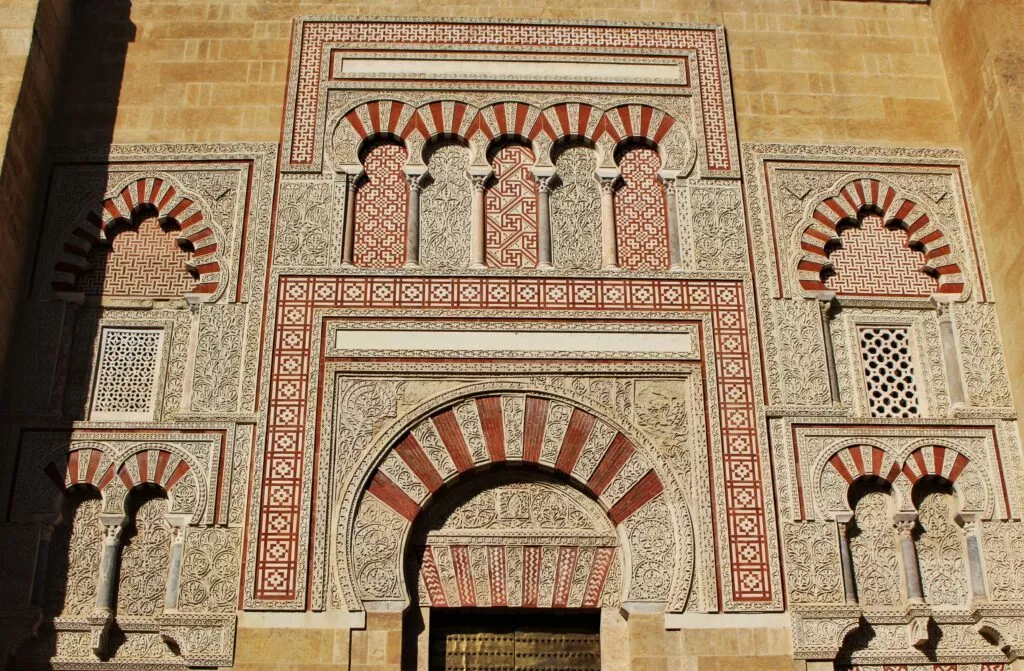
Discover other beautiful places in Andalusia in the Andalusia blog pages.
Here is the link to receive our newsletter from the andaluciamia.com blog
Selection of 10 great things to do in Granada and Alpujarra
The latest articles on Andalucia
-
Interactive map of Andalucia with best places to see
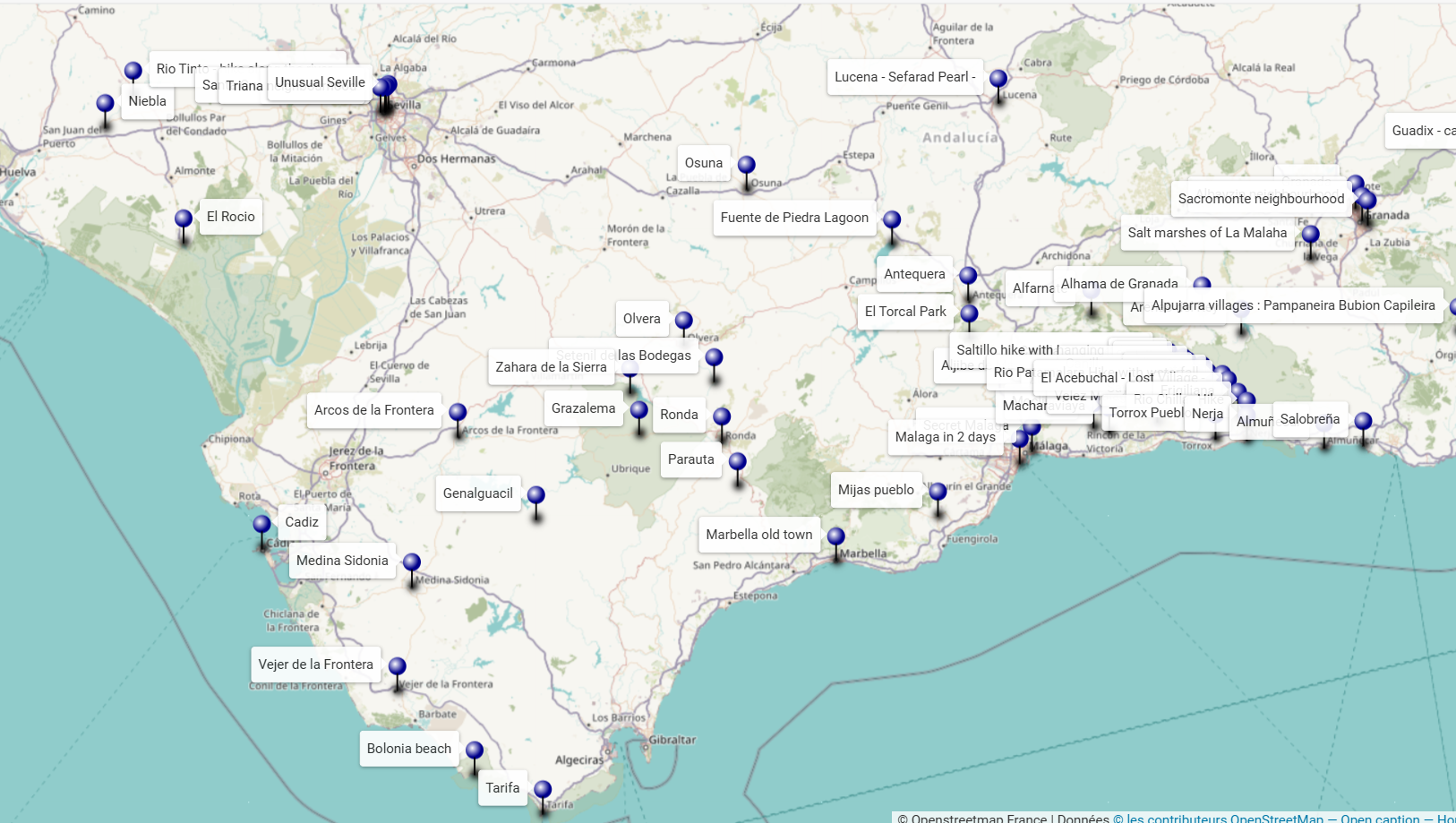
An interactive map of Andalucia to discover the sites to see around your holiday destination or to prepare a tour or road-trip.
-
10 best things to see in Jaen
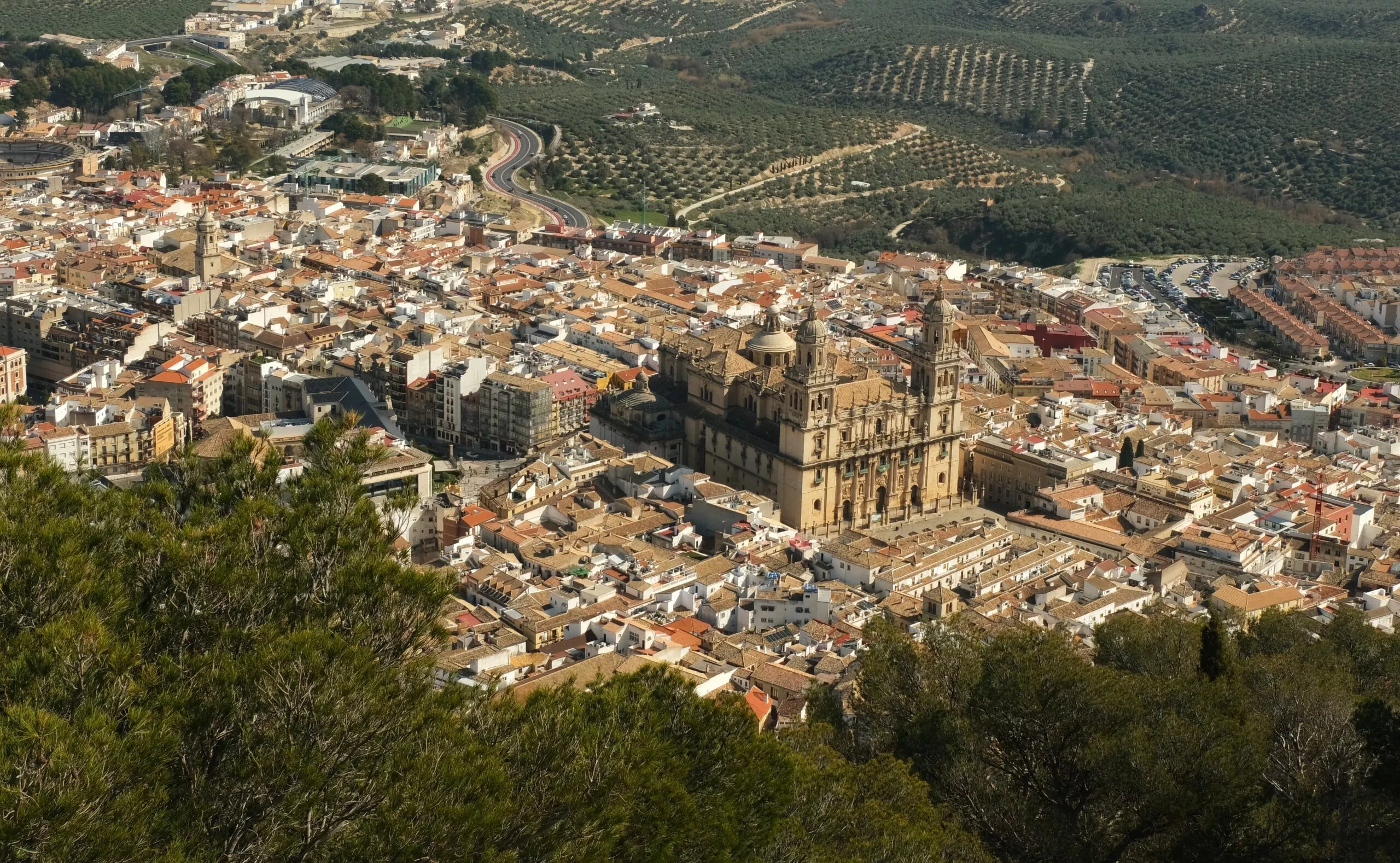
The essential things to see and do in Jaen, Andalucia. Jaen, the world capital of olive oil, has a few treasures to discover.
-
Rum in Andalucia and…sugar cane
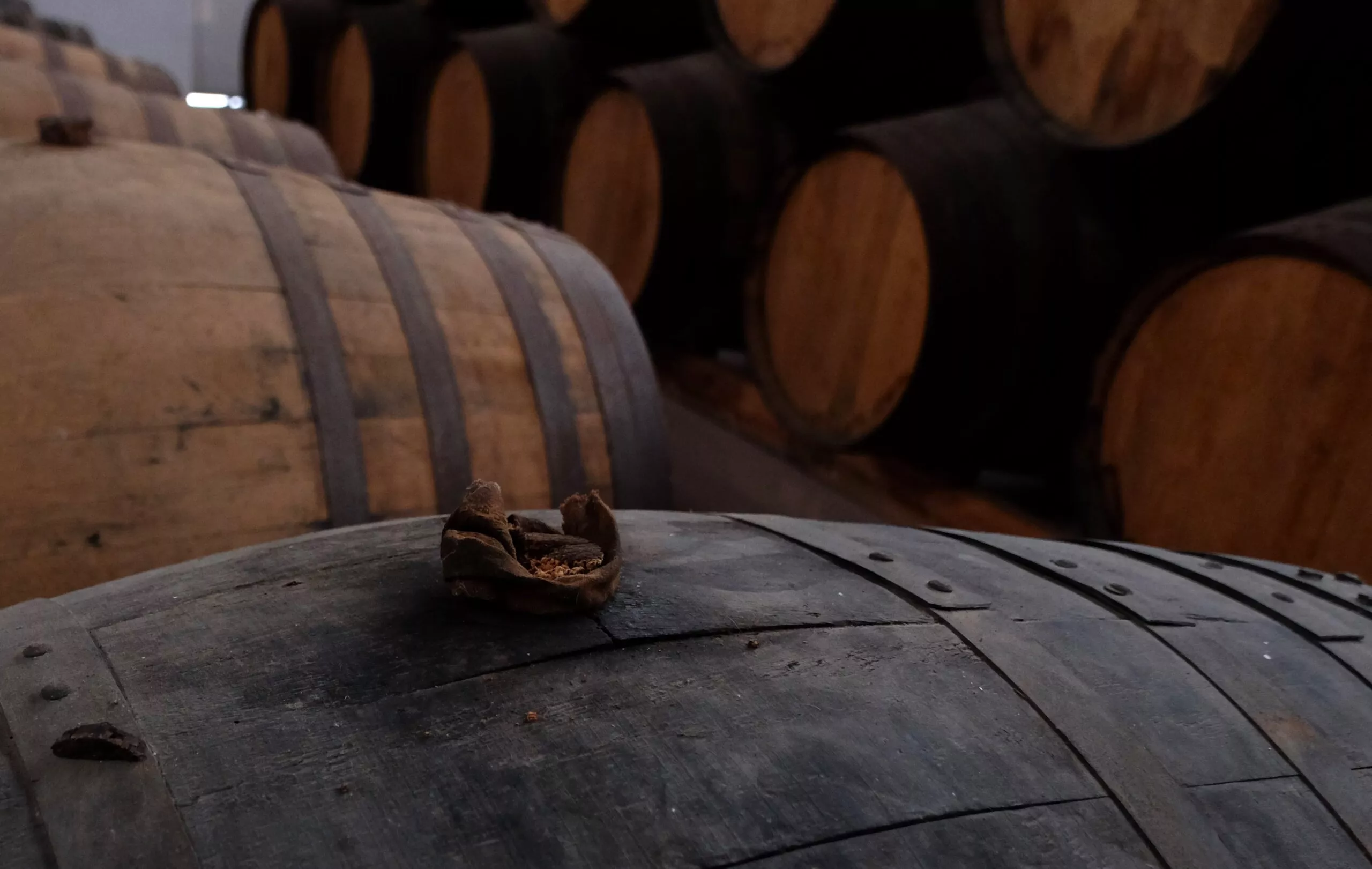
Let’s discover a rum producer and sugar cane grower in Andalucia. He’s probably the only one to produce 100% local rum!
-
Teba’s Douglas Days to celebrate the Andalusian Braveheart

An incredible and unusual festival in Andalucia: the Scottish Days in Teba, near Malaga. It takes place in August.
